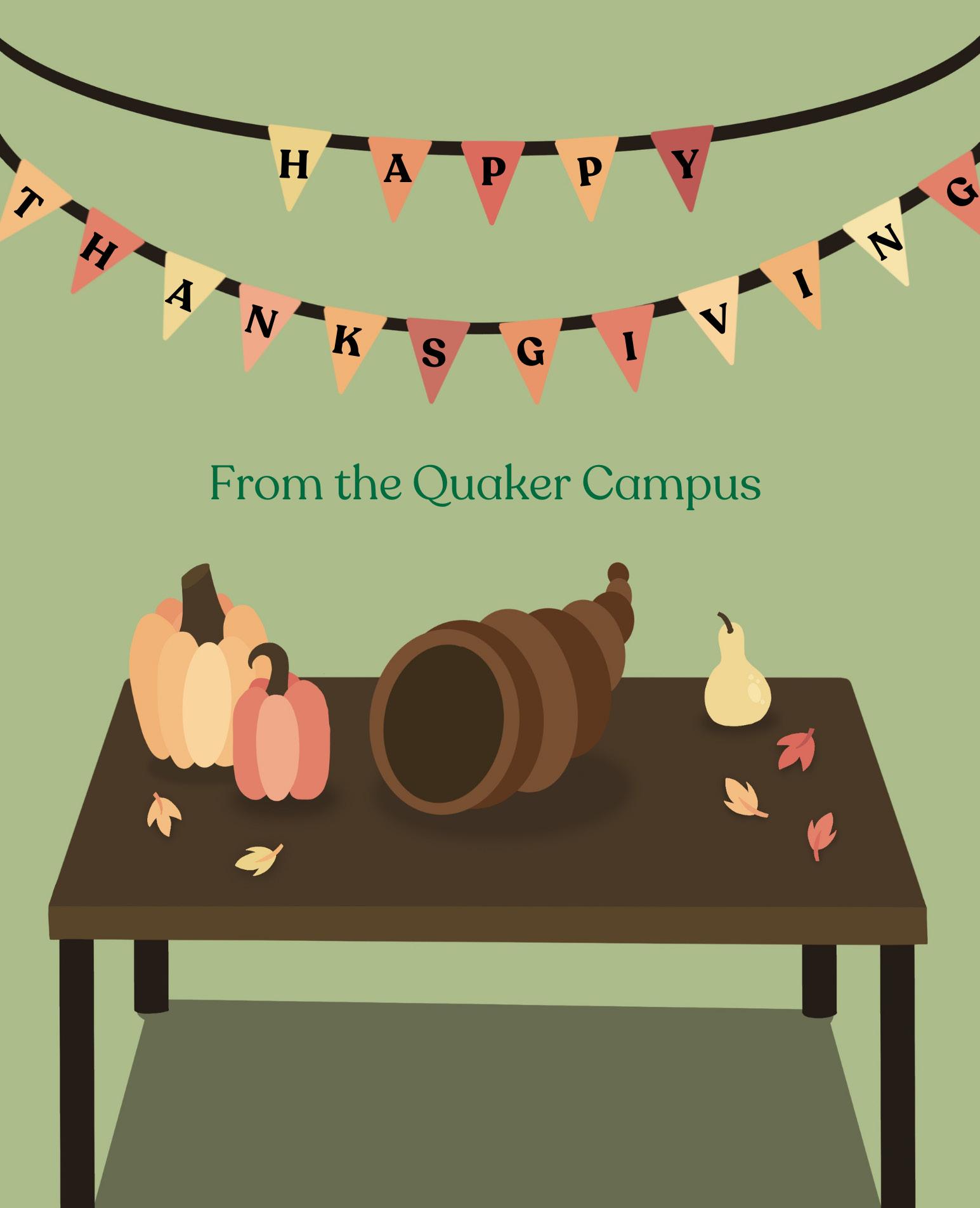Opening Up Trump’s Cabinet
Piper Guinn NEWS EDITOR
One of the unique powers that a newly elected president has in the United States is the ability to hand-select their cabinet. Members of the president’s cabinet oversee different sectors within the executive bureaucracy–such as the State Department and Department of Homeland Security–and are typically chosen due to experience in that sector. Almost all appointments require Senate approval. Let’s take a look at some of the key placements Trump has announced so far:
tention to “destroy every element of Hamas” rather than supporting a ceasefire in Gaza. As Secretary of State, Rubio would handle foreign relations and critical alliances, acting as the U.S.’ top diplomat.
Secretary of DefensePete Hegseth
The Department of Defense oversees the actions of the Pentagon and the U.S. military. Fox News anchor and combat veteran Pete Hegseth— who served overseas in Iraq and Afghanistan, as well as domestically on the Minnesota National Guard—has called for a purge of

Vice President - J.D. Vance
Unlike most of the president’s cabinet, a pick for Vice President (V.P.) does not require Senate approval. A Republican senator from Ohio, J.D. Vance was selected as Trump’s V.P. candidate over the summer. In the past, Vance has spread baseless rumors about immigrants and defended Trump’s false assertions that the 2020 presidential election was stolen. A source close to the Trump administration told ABC News that Vance will be Trump’s “eyes and ears” as V.P. and “deliver the hammer” in the Senate.
Secretary of State - Marco Rubio
Currently serving in the Senate, Marco Rubio (R-Florida) is frequently considered a foreign policy “hawk.” According to BBC News, the Senator voted against a $6 million aid package to Ukraine, called China “the largest, most advanced adversary America has ever faced,” and has backed Israel’s in-
“woke” generals in the Department. Hegseth lacks experience in elected office, but has been a prominent voice on the subject of traditional masculinity. He openly expressed the opinion that, “We should not have women in combat roles” because it “has made fighting more complicated,” AP News reported.
Attorney General - Matt Gaetz
Tasked with leading federal investigations through the FBI and other law enforcement agencies, the Attorney General is the nation’s lead prosecutor. Trump has been vocal on his social media platform Truth Social regarding his mission for Congressman Matt Gaetz to “end the partisan weaponization of our Justice System” and investigate “political adversaries.” Despite the Department of Justice’s (DOJ) conviction of Trump for 34 felonies, Gaetz firmly believes that Trump is innocent, and has been investigated for sexual misconduct himself.
Director of InteriorDoug Burgum
The Department of the Interior manages U.S. public land, natural resources, and the continental shelf.
Republican Doug Burgam—currently the governor of North Dakota—would help shape the future of U.S. fossil fuel consumption and land use. Burgam plans to “unleash American energy dominance” via increased fossil fuel production, and does not believe that human action has exacerbated the climate crisis, despite scientific evidence that it has.
Director of Health and Human Services - Robert F. Kennedy Jr. Robert F. Kennedy Jr. ran an independent presidential campaign against Trump, but ended his bid this past August. As director of health and human services, RFK Jr. would be responsible for handling outbreaks such as COVID-19, administering health insurance benefits, and regulating medical treatment. His baseless theories regarding public health have raised concern among medical professionals—he is the founder of the anti-vaccine group Children’s Health Defense and spread vaccine misinformation during the COVID-19 outbreak.
Director of Homeland SecurityKristi Noem
Under the Trump administration, the Director of Homeland Security will play a key role in advancing immigration policy and a crackdown at the border, as well as matters of domestic law enforcement and cybersecurity. Currently serving as the Republican governor of South Dakota, Kristi Noem has no experience in law enforcement, but has invested in strengthening South Dakota’s cybersecurity and been vocal on immigration, sending her state’s National Guard troops to the southern border at least five times, according to Politico.
Director of Nat’l IntelligenceTulsi Gabbard
A former Democratic congresswoman turned Trump supporter, Tulsi Gabbard will oversee U.S. intelligence (including the CIA), a community President-elect Trump has repeatedly referred to as untrustworthy and part of the “deep state.” During his 2024 campaign, Trump promised to overhaul intelligence agencies, a task Gabbard will be critical in carrying out. Gabbard is a veteran who was deployed to Iraq and Kuwait, but does not have experience in the intelligence community.
This article has been condensed for print. To read more, visit medium.com/the-quaker-campus.
Gavin Newsom Calls California to Action
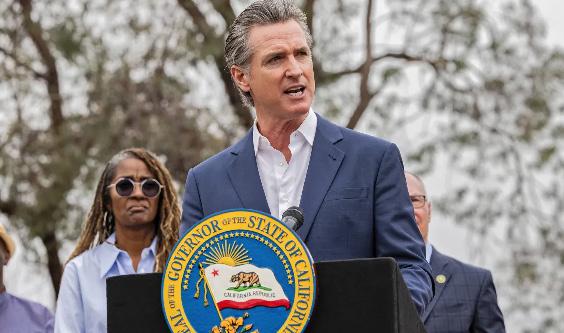
Sara Martínez
STAFF WRITER
After Donald Trump was confirmed as the winner of the 2024 presidential election, California Governor Gavin Newsom called on state lawmakers to convene a special session to protect statewide policies that may be threatened by the Trump administration. The call to action was not uncharacteristic of Newsom, who was a sharp critic of Trump during his first term as Governor from 2019-2022, which Trump was president for two years of.
During Trump’s first presidential term, then California Attorney General Xavier Beccera—with the full support of Newsom’s administration—filed over 100 lawsuits against Trump’s administration on a range of issues including climate change policies, immigration, and sanctuary state law.
Some of the cases that were won blocked the addition of a citizenship question to the U.S. Census, upheld protection for recipients under the Deferred Action for Childhood Arrivals program, or DACA, and rejected the Trump administration’s challenge to the 2017 Sanctuary State Law via the Supreme Court. As a result of these lawsuits, California spent an estimated $43 million over the course of four years.
Along with its legal precedent, Newsom’s call for a special session “reignited Califonia’s resistance campaign against conservative policies that state Democratic leaders started during the first Trump administration,” according to AP News.
Current California Attorney General Rob Bonta also made a public announcement on Thursday, Nov. 7 in the City of San Francisco. During his speech, Bonta acknowledged a second Trump administration and promised that the California DOJ will protect citizens’ rights and freedoms, stating, “Progress will prevail. No matter who is in the White House. No matter
who controls Congress. In California, we will keep moving forward.”
This movement among California lawmakers is part of a wider discourse among Democratic leaders who are prepared to defend their states’ policies in the wake of a second Trump administration.
After the election, Illinois Governor J.B. Pritzker stated in a press conference, “Despite [Trump’s] threats to health care coverage and educational opportunity and a fair minimum wage, Illinois will continue to invest in the wellbeing and prosperity of our people.”
Governor Kathy Hochul of New York spoke a day before both Pritzker and Newsom, although her stance touched on the possibility of working with the new administration: “If possible, we will work with [Trump], but we will not compromise our values, our integrity, or our principles.”
So far, the Trump administration has not made a formal response to this widespread sentiment amon Democratic leaders. However, President-elect Trump did make an announcement on his social media platform Truth Social on Friday, Nov. 8, in which he criticized Gavin Newsom directly: “Governor Gavin Newscum is trying to KILL our Nation’s beautiful California. For the first time ever, more people are leaving than are coming in. He is using the term ‘Trump-Proof’ as a way of stopping all of the GREAT things that can be done to ‘Make California Great Again,’ but I just overwhelmingly won the Election.”
In the final months leading up to Trump’s inauguration in January, residents of California, Illinois, and New York can expect to hear updates about their state leaders’ plan to fight Trump policies.
In California, Newsom’s special session is set to begin on Dec. 2 and will surround relevant issues such as reproductive rights, climate action, and immigration that may be impacted under Trump.
Angevine Analyzes the Election Outcome
Piper Guinn NEWS EDITOR
In the wake of the 2024 election, many Americans were left wondering: how exactly did Donald Trump defeat Vice President Kamala Harris? Trump ultimately won by a margin of 86 electoral votes and 2.6 million overall votes, which was far greater than polls anticipated.
According to NPR, national polls conducted before the election underestimated support for Trump by three percentage points across seven battleground states.
Dr. Sara Angevine, an Associate Professor of Political Science at Whittier College, analyzed a series of exit polls from Fox News, CNN, and NBC to help students understand which demographics turned out in support of Trump and what changed since 2020, when Trump lost the presidential election to Joe Biden.
Among men and women, Angevine demonstrates that “Trump won men by 13 percent, who are 47 percent of the electorate,” and “Harris won women by 8 percent, who are 53 percent of the electorate.” From 2020 to 2024,
Trump gained two percentage points among all women, and one percentage point among all men.
When looking at race and gender together, Trump received the greatest support from White men, earning 60 percent of their votes, followed by Latino men (55 percent) and White women (53 percent). Trump has gained substantial support among Latino men since 2020, with an increase of 18 percentage points. Support for Trump among Latino women has also increased by 7 percentage points in 2024 compared to 2020.
Harris won among Black women, Black men, Latino women, and all other races, notably earning 91 percent of the Black woman vote.
However, compared to 2020, Harris “improved upon Biden” among Black women voters “by only one percentage point” and “still [polled] lower than Clinton and Obama,” Angevine notes. In the 2016 presidential election, Hilary Clinton was supported by 94 percent of Black women, and Barack Obama was supported by 96 percent of Black women in 2008 and 2012.
Regarding the economy—one of the issues Trump was most crit-
ical of the Biden administration on—“75 percent of voters have had a moderate to severe hardship caused by inflation. Trump won both [of those] groups, and [won] the severe hardship [group] by 50 percent,” according to Angevine. This sense of discontent with the economy and the current administration may have driven voters away from Harris—the current VP—and toward Trump.
“Economic survival is more important than many other issues for decision-making,” Angevine maintains. In general, voters who feel that their family’s financial situation is better than four years ago—when Trump was serving his first term— were more likely to vote for Harris, and those who feel that their situation has gotten worse were more likely to vote for Trump. Angevine further explains that, “Inflation under Biden and Harris” was tied to Harris’ 2024 campaign, which wounded her outcome in the polls.
Among Latino voters, 46 percent feel that their family’s financial situation has gotten worse compared to four years ago, and of those, 81 percent voted for Trump. Only 19 percent of Latino voters feel
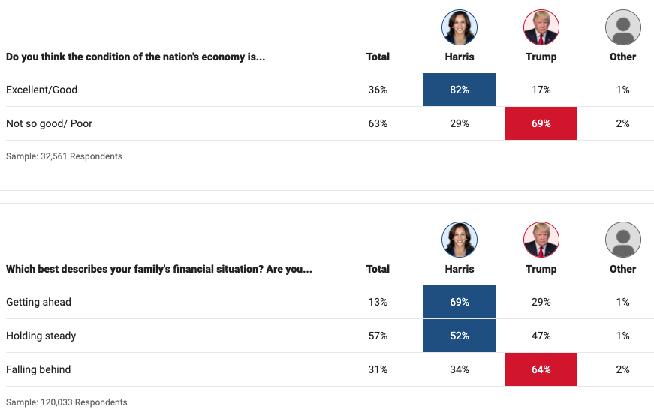
THE QUAKER CAMPUS STAFF
EDITOR-IN-CHIEF
AnnA GAber
INTERIM
EDITOR-IN-CHIEF
ChelseA bArtilAd
DEPUTY EDITOR
ChelseA bArtilAd
MANAGING EDITOR
JonAthAn bermudez
NEWS EDITOR
PiPer Guinn
OPINIONS EDITOR
luCy CAmPbell
SPORTS EDITOR
oliviA nuñez
CAMPUS LIFE
EDITOR
emmA GAlvAn
FEATURES EDITOR
JonAthAn bermudez
A&e editor
sArA mArtínez
HEAD COPY
EDITORS
emmA GAlvAn
sArA mArtínez
soCiAl mediA
ChelseA bArtilAd
ASST. SOCIAL
MEDIA
lexis brAttAin
miChelle Cortes
STAFF WRITERS
AllArA bAker
dArreionnA roChe
PAolA ruiz
PrisCillA CoronA
simon sAntAnA
COPY EDITOR
eliAs loyA
GRAPHIC DESIGNERS
Arysse Grindulo
nAdiA miller
CARTOONIST nemi
ASTROLOGIST
viA
FACULTY ADVISOR
JosePh donnelly
that their financial condition improved compared to four years ago.
This shared sentiment is likely a contributing factor to the aforementioned shift among Latino voters toward Trump. However, “We do not know enough about what happened with Latino men,” Angevine states.
Anti-transgender ads from the Trump campaign, which utilized scare tactics to generate unease among voters, may have also influenced the President-elect’s success. Harris and the Democratic Party campaigned on protecting transgender Americans, while Trump and MAGA (Make America Great Again) Republicans are associated with anti-trans and exclusionary rhetoric.
Towards the end of the campaign, $30 million went toward a Harris attack ad describing her as “crazy,” referencing statements she made on providing medical assistance to transgender inmates in federal prisons.
While “we do not know if the anti-trans ad dump mattered,” Angevine explains, “Sports were the target
market, [which are] heavily watched by men,” and may have encouraged male voters to support Trump.
On the topic of democracy, 73 percent of all voters think democracy is under threat, but “That is a feeling that both parties share,” Angevine says. 51 percent of those who voted for Trump and 48 percent of those who voted for Harris expressed this belief. However, 56 percent of those who voted for Harris were concerned about violence as a result of this election, compared with 46 percent of Trump voters.
Overall, Angevine illustrates, “Harris did very well despite the overall outcome.” Trump benefited from his traits as a white man, which upholds the “status quo of presidential leadership.” Comparatively, Harris’ status as a woman of color is “deviant on gender and race for presidential leadership.” Trump also benefited from inflation and the overall economy, as “people remember being better off financially when he was President.”
President Provides
Whittier Works Update
Chelsea Bartliad INTERIM EDITOR-IN-CHIEF
During her induction ceremony last month, President Kristine Dillon introduced to the Whittier College community an initiative titled “Whittier Works.” This initiative aims to “shape the future of career readiness here at Whittier College,” and is one of many recent investments in the students of the College.
The President released an update via email regarding Whittier Works on Nov. 14. As described in the email—which was sent out to all faculty and students—the initiative reflects the College’s commitment to a liberal arts education by connecting academia and real world experiences, preparing students for life after college.
In a statement to The Quaker Campus, Dillon elaborated that the goal of Whittier Works is to ensure that the liberal arts education pro-
vided at Whittier is “the best foundation for building career and leadership success, connecting classroom learning with hands-on experience.”
According to Dillon, the initiative will involve “experiential and project-based learning” along with “internships and community partnerships.”
She states, “My hope is that, with the support of our alumni and other donors, this program will continue to grow and our students will all have the ability to complete an internship that equips them for the future.”
In addition to the initiative, Dillon announced the arrival of a new Director of Civic Engagement to increase collaboration between the Career Center and faculty-led initiatives, but a specific person has not yet been named to the position. This story is still in development. While limited information is available, the QC will provide updates as information is released.
LETTERS TO THE EDITOR
Submissions may be emailed to qc@poets.whitttier.edu in .doc or .docx format. Submissions must include the author’s name and year of graduation or position at the college in the signature. Letters are due by Tuesday at 5 p.m. to make it into that week’s issue. Submissions should be no more than 500 words. Letters should be well-proofread, as they will not be edited. Letters that fall outside of these guidelines will be returned to the author with a request for revision.
Due to the high cost of publication, members of the Whittier College community are permitted three copies per issue. Additional copies may be purchased with prior apporval for 50 cents each by contacting the Quaker Campus. Newspaper theft is a crime, and those who violate the three copy rule may be subject to civil and criminal prosecution.
The Quaker Campus does not change material posted on online articles once they have been published in the paper — with the exception of an error being found. Only then will a correction be made to the online version. The Quaker Campus is a publication of Whittier College. Columns and Signed editorials do not necessarily reflect the opinions of Whittier College nor its affiliates.
Ballot Measures Bring Change to Residents
Michelle Cortes STAFF WRITER
Across the state, millions of Californians voted on issues ranging from climate change to healthcare on Election Day. While parts of the state are still counting ballots, the fate of most ballot measures has been decided. Let us take a look at the measures residents of Whittier voted on this year, and what will unfold with each passing measure:
California Measures
Prop. 2 - PASSED
With this proposition’s approval, which received 8,357,733 yes votes, California will provide $10 billion to build schools and community colleges. More specifically, $8.5 billion will be allocated towards K-12 schools and $1.5 billion to community colleges. This money will remove lead from water, create transitional kindergarten classrooms, fund careers, and build technical educational facilities. It will also benefit many lower-income school districts. Prop. 2 was supported by State Superintendent of Public Instruction Tony Thurmond and the Association of California School Administrators, alongside both the California Republican and Democratic Party.
Prop. 3 - PASSED
Prop. 3, which passed with 9,024,228 yes votes and with support from Governor Gavin Newsom and the California Democratic Party, enshrines the right to samesex marriage in California’s constitution, essentially nullifying a past Prop. 8, which defined marriage as between a man and a woman. This measure will have a high impact on the LGBTQ+ population, as California is home to the largest number of LGBTQ-identifying individuals across the nation.
Prop. 4 - PASSED
With the approval of Prop. 4, $10 billion will be authorized for environmental and climate projects. Of this $10 billion, $1.9 billion will be used to improve water quality. Other funds will be allocated toward protecting the State from climate disasters such as wildfires and heat waves. Low-income communities—which are disproportionately affected by climate change—will be prioritized. This measure received 8,567,876 yes votes and was backed up by numerous wildlife and water associations.
Prop. 5 - FAILED
This proposition would have facilitated the ability of local governments to fund affordable housing and infrastructure projects. However, the measure received 7,876,058 no votes, and therefore did not pass.
Prop. 6 - FAILED
Intended to prohibit the State of California from punishing inmates with involuntary work assignments or forced labor, Prop. 6 failed with 7,489,695 no votes.
Prop. 32 - UNDETERMINED
The Associated Press has yet to call Proposition 32. However, of the 94 percent of votes that have been counted, the measure is on track to fail with 7,321,645 no votes. If passed, this proposition would raise the state minimum wage from $16 to $17 for the rest of the year and further raise it to $18 beginning in Jan. 2025.
Prop. 33 - FAILED
Prop 33, which would have allowed local governments to control rents on any type of housing, failed with 8,570,352 no votes.
Prop. 34 - UNDETERMINED
Proposition 34 has not yet been declared to have passed or failed.

However, yes votes are leading with 6,989,902 counted thus far. This proposition will require some California drug providers to follow new rules on how they spend revenue earned from a federal drug discount program and put into place a law that requires all state agencies to negotiate for lower drug prices as a single entity rather than individually.
Prop. 35 - PASSED
With 9,598,799 yes votes, Proposition 35 passed on Nov. 5. Under this measure, the State will be required to spend a certain portion of its tax budget for healthcare plans on Medi-Cal. Much of the revenue will be going toward primary and specialty care, emergency services, family planning, mental health, and prescription drugs. The 14 million Californians who use Medi-Cal would be most impacted by this. Both major parties supported this measure, as did a number of medical associations.
Prop. 36 - PASSED
Proposition 36 passed on Nov. 5, 2024 with 9,813,217 yes votes. This proposition will reclassify some misdemeanor theft and drug crimes as felonies. In addition, this measure will produce a new brack-
et of crime, which is the “treatment-mandated felony.” Those who do not contest a guilty verdict can complete a drug treatment program instead of going to prison. However, if this treatment is not completed, they can face up to three years.
Los Angeles (LA) County
Measure A - PASSED
This measure passed with 1,587,750 yes votes and support from the Women’s & Children’s Crisis Shelter, Habitat for Humanity of Greater Los Angeles, and LA Family Housing. According to CBS News, Measure A will repeal the Measure H tax and replace it with a new halfcent sales tax. The money raised will be allocated toward homeless services and affordable housing.
Measure E - PASSED
With 685,992 yes votes, Measure E has passed. Its approval authorizes an increased parcel tax; a type of property tax that will be placed on some properties across LA County. In other words, some individuals may have to pay more taxes on their homes and other properties. This raised parcel tax will be put towards the Fire Department to aid in the preparation and response to wild-
fires. Some supporters of this measure were Firefighter Alexis Kendricks, AirOps Paramedic Johnny Gray, Assembly Member Freddie Rodriguez, and Firefighters IAFF.
Measure G - UNDETERMINED
The outcome of Measure G has not yet been declared. However, this measure aims to expand the Board of Supervisors, create two new government entities, and increase public financial transparency across the County. In addition to this, it would create an independent ethics commission and nonpartisan legislative analyst. This measure would also mandate that county departments present annual budgets at public meetings.
City of Whittier
School District Measure WPASSED
Measure W passed on Nov. 5 with 13,630 votes. Measure W will authorize the Whittier City School District to issue $5.4 million in bonds to fund improvements and renovations for schools in the City of Whittier School District, and will require an estimated property tax levy of $30 per $100,00 in assessed value.
Pico Rivera Dives Into New Water Treatment
Sara Martínez A&E EDITOR
After WWII, the City of Pico Rivera rapidly industrialized alongside other cities in the San Gabriel Valley, which led to increased contamination of its water supply. Today, Mayor Andrew Lara feels “residents are having to pay their fair share to clean up water they never polluted.”
On Monday, Nov. 4, the City unveiled a new water treatment plant that “underscores Pico Rivera’s obligation to safeguard water quality for future generations,” according to Lara. Pico Rivera is also the first city in Southern California to “have been issued a license (by the State Water Resources Control Board) to operate [its] filtration system.”
The new $15 million water treatment facility is part of the Pico Rivera Water Authorities’ Water Master Plan, which was adopted in July 2020 following statewide legislation regarding chemical substances in water.
Based on state testing in 2019, seven of Pico Rivera’s wells exceed the State’s response levels (RLs).
According to legal professional Best Best & Krieger LLP, RLs “are thresholds at which the Board recommends water systems remove
The City receives its water supply from three different sources: The Pico Rivera Water Authority (PRWA), the Pico Water District (PWD), and the San Gabriel Valley Water Company (SGVWD).
a water source from use or provide treatment if feasible.” After this was revealed, the City began its long road to acquire funding for a new filtration system. Although Lara celebrated the completion of the project, the City is still involved in multiple legal cases with the companies responsible for raising chemical levels by leak-

ing PFAS—a group of potentially hazardous elements—into the City’s groundwater aquifers. Currently, Pico Rivera is involved in lawsuits against multiple companies, such as the well-established multinational conglomerate company, 3M.
Although manufacturers are not required to disclose the use of PFAS to consumers, and the EPA does not test or regulate most PFAS, California’s State Water Resources Control Board has made significant strides in protecting its residents from PFAS by lowering the response levels.
State Assembly Bill (A.B.) 756, which took effect Jan. 1, 2020, is an amendment to the 1995 California Safe Drinking Water Act 1995 and “authorized the state board to order a public water system to monitor for perfluoroalkyl substances (PFOA) and polyfluoroalkyl substances (PFOS).”
PFOA and PFOS are synthetic organic chemicals that are part of the PFAS group. Most commonly found in industrial and consumer products like water-resistant clothing, PFAS have made their way into
our air and water supply. According to the Natural Resource Defense Council, PFAS are considered “forever chemicals” since they are not broken down in the human body. The bill additionally lowered the response-level threshold for chemicals in water sources, which means that public water sources across California are now held to higher standards of cleanliness. A.B. 756 requires California water systems— independent, group, and public—to disclose any detected levels of PFAS in their annual consumer reports. It also requires them to either close the water source, provide treatment, or report detections above RLs to consumers within 30 days if the water source remains in service.
The new treatment facility was developed thanks to a $5.8 million donation from the Water Replenishment District of Southern California, $7 million from the PRWA, and a $2.5 million allocation from the House Appropriations Committee’s 2022 energy and water funding bill, which was sponsored by Representative Linda T. Sánchez.
What’s up,
Whittier?
Stay up to date on events! For further info, visit https://whittier.campuslabs.com/Engage/
Third Space Thursday: Writing Thank You Cards
• Thursday Nov. 21 at 11 a.m.
• Campus Center Courtyard
Full Body Massage (cupping and hot stones) For 30-60 Minutes
• Thursday Nov. 21 from 12:30 p.m to 3:30 p.m.
• Student Health and Wellness Center
International Education Week: Friendsgiving Dinner and Celebration
• Thursday Nov. 21 from 6:30 p.m. to 8;30 p.m.
• Dezember Alumni House
Geezer Night
• Thursday Nov. 21 from 6 p.m. to 10 p.m.
• Club 88
Hot Cocoa and Chill
• Friday Nov. 22 from 7 p.m. to 9 p.m.
• Turner Hall First Floor TV Room
Karoke Night Party!
• Friday Nov. 22 from 6 p.m. to 10 p.m.
• Stauffer Main Lounge
Planner Party
• Monday, Dec. 2 at 3:30 p.m.
• Ettinger Lounge
Craft Hour
• Tuesday Dec. 3 at 11:30 a.m.
• Ettinger Lounge
Open Hours for Special Collections
• Tueday Dec. 3 from 3 p.m. to 6 p.m.
• Wardman Libary
PBL (Project Based Learning) Exposition
• Wednesday Dec. 4 from 12 p.m. to 1:20 p.m.
• Hoover Hall
It's A Wonderful Life: A Live Radio Play
• Wednesday Dec. 4 from 7:30 p.m. to 9:30 p.m.
• Robinson Theatre in the Ruth B. Shannon Center for Performing Arts
Wellness Coalition Meeting
• Friday Dec. 6 from 11:15
a.m. to 12 p.m.
• Online
Poet Musicale
• Friday Dec. 6 from 12 p.m. to 1 p.m.
• Memorial Chapel located next to the Shannon Center
De-Stress Day
• Monday Dec. 9 from 11 a.m. to 3 p.m.
• North Lawn
CAMPUS LIFE
AOKP's Tournament of the Ages
Piper Guinn NEWS EDITOR
Weekends at Whittier College tend to be a quiet affair; students are tucked away in their dorms to study, get much-needed sleep, or catch up on their favorite show. This past Saturday, however, cries of victory mixed with the clashing of swords resonated through the Upper Quad—an array of sounds attributed to the campus' live-action role playing (LARP) club, the Artorian Order of the Knights of Pendragon, also known as AOKP.
At their queen’s invitation, AOKP hosted a Medieval-based Tournament of the Kingdom event that was open to all students and visitors to the campus, where LARPers faced off against one another in battle using faux weapons, all in honor of Her Majesty, Queen Roya. The tournament was held from 11 a.m. through 5 p.m., with scheduled battles between the members held throughout the day. Participants were separated based on their weapon type and randomly pitted against one another in a single elimination-style bracket. Before each fight, the opponents bowed twice, paying respects to both Queen Roya and to each other. Once a fight commenced, they circled one another, eyeing weaknesses and planning for each of their attacks. Some fights were over with a swift ax to the legs, while more skilled players danced around their opponent's
weapons. Most fought for their own honor, but some battled on behalf of someone they loved or respected. Only students involved in AOKP were eligible to participate in the tournament–as the club has a specific combat system taught upon joining–but all students were welcome to spectate or take part in other activities present at the tournament. In addition to the battles, AOKP set up a crafts table, a Pinthe-Tail-on-the-dragon game, a photobooth, and a raffle for handmade knitwear and various other crafts.
While AOKP has been around for decades, this tournament is the first event of its kind. The club typically holds three orientation events at the beginning of each semester to recruit new members, with their meetings happening on Thursdays after dark. As third-year and President Kallie Kaaihue-Paopao jokes, “If there’s yelling on a Thursday night, that’s probably us.” However, they have not hosted a schoolwide affair in recent years.
Next semester will mark the 45th anniversary of AOKP at Whittier College, so members decided to put together this tournament to help fundraise for a celebration in the Spring. Although they will not be recruiting in the Spring, the event still allows for AOKP to showcase their creativity, interests, and combat styles. Fourth-year Crow Caton helped organize the tournament because he “wanted a public community event where
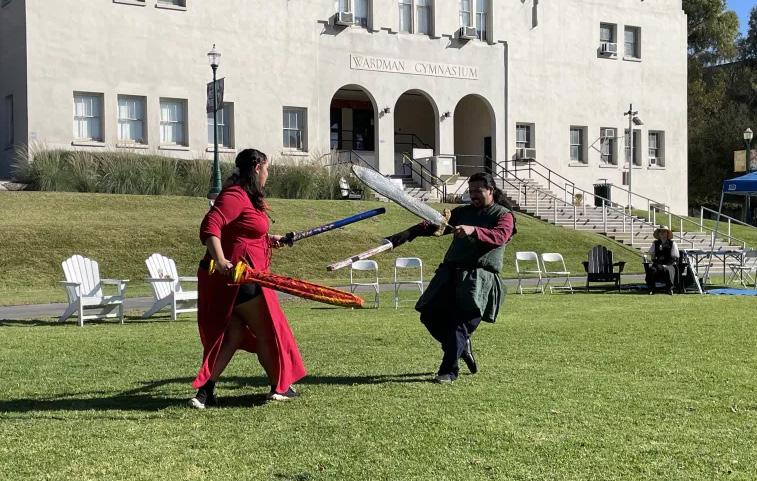
people can fight and cheer for their favorites.” Caton was “raised as a renaissance fair kid,” so putting a public tournament together “filled a part of [his] soul.”
Several yards away from the fighting, alumni Kira Casteneda could be seen teaching period-relevant skills at the crafts table. Casteneda has been a member of AOKP for 10 years, and feels like it is “a home away from home.” Now that she has graduated from the College, Casteneda looks forward to “bringing new students into the club.” By showing students how to cross-stitch a beginner-friendly dragon pattern, Casteneda sought to “provide a space to explore a new side of creativity.”
AOKP brings in and supports all sorts of creatives among their current members and alumni, particularly those majoring in Theater, English, and Creative Writing. Each member designs their own character, molding an alter ego
to fit their personality or become something completely different.
While Kaaihue-Paopao is a Whittier Scholars Program student and is crafting her own major, LARPing allows her to “express [her] fantasy creativity” outside of her intellectual sphere.
As the day progressed, fighters grew weary and laid down to soak up the sun, taking a break from defending their honor. Non-LARPers cheered on club members during their fights and meandered by the crafts table in between rounds. Regardless of whether a student was dying gloriously in battle or mastering the cross-stitch, AOKP’s tournament brought laughter and friendly competition to the Upper Quad.
If you’d like to keep up with AOKP and their future adventures, look out for the sounds of swords when walking around campus, or you can follow the club at aokp_wc on Instagram.
Busting Out The Films With VPS
Nadia Miller GRAPHIC DESIGNER
The highly-anticipated Video Production Studios (VPS) Open House took place on Wednesday, Nov. 6 at 7:30 p.m. at the Campus Courtyard. The night sky and brisk evening air provided a perfect backdrop while VPS finalized their preparations, eager guests grabbed soda, Chillin' Boba, and a slice or two of Little Caesars pizza and started waiting to see just what VPS was all about.
VPS has been at Whittier College for some time, but no official leadership was present. Going behind the scenes to see what VPS could offer to the College community, the club welcomes all Film majors and minors, and cinema enthusiasts to join in on more fun to come and “foster a community of film majors,” according to one of the members.
Sliding through the prepared presentation, the members of the VPS executive board were excitedly introduced as third-year President Nathan Carrasco and third-year Salaar Ansari as the Vice President. Fourth-year Cara Delos Reyes, introduced as the social media manager, already has professional work on-sets. Third-year secretary Meredith Lee created the lovely short film Things of Beauty, which also screened during the evening. The current treasurer is first-year
Shay Cassim, the only member of E-board who is not a Film major. And although she was not present for the evening, Martha Perez was still introduced as their behindthe-scenes photographer.
With the beginning of the screenings, cheers arose from the attendees at what was to come.
Starting with Carrasco and Ansari’s short film Adam’s Choice, starring Ansari as Adam. Carrosco explained that he wanted it to become a sort of web series that displays little things from college life. This specific short film is a comedy, displaying many different experiences one may find while at college.
The next short film that was screened was Things of Beauty created by Lee. The third-year was inspired by the silent movie era and thought, “What more than a silent film about fairies.” The film follows two fairies as one of them gets taken by hunters.
The final screening of the night was the comedic sci-fi film The Sign. Directed by Reyes, the film follows a college drop out as she tries to become a comedian.
At this point in the evening, the remaining members of VPS decided to do a Q&A, letting the audience get to know more about the club and its members.
One of these questions was how film has shaped them. The most prominent thing Carrasco has to say is “It is me.” He explains
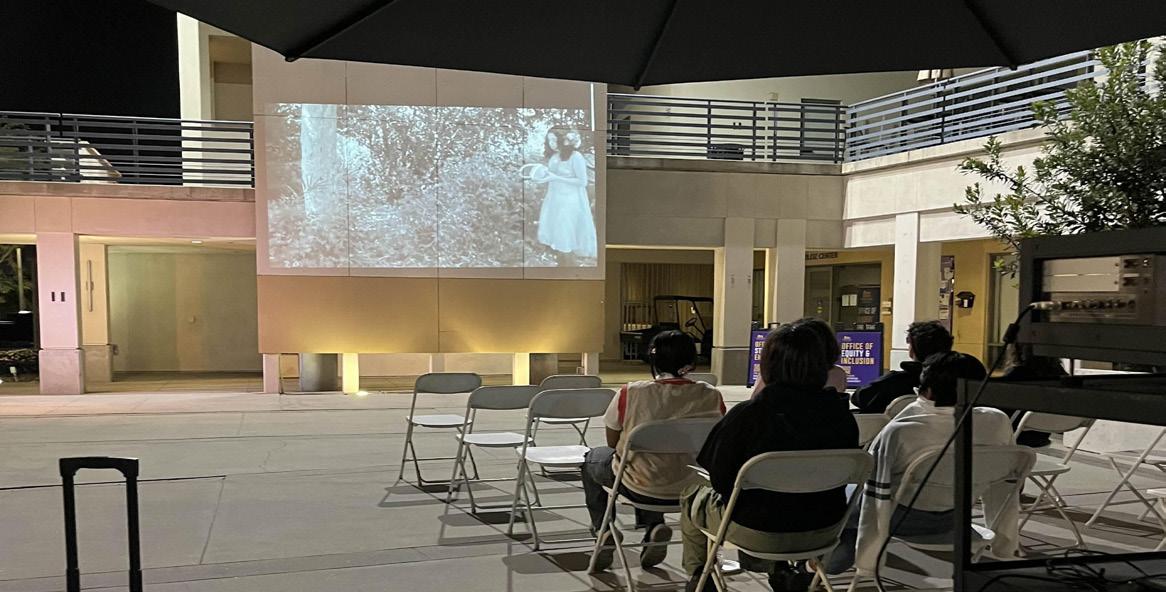
that it was a big part of his life, but that it didn't take over. Reyes started saying it was, “break out of [her] shell.” Lee reminisces on a memory of watching the cable at her aunt’s home and seeing On Demand Behind the Scenes. Going on to explain that she fell in love with film and how “storytelling is something I love.” Ansari happily expresses, “films have shaped me,” having remembered watching Terminator 2: Judgment Day and feeling inspired. After getting to know more about the members, the topic moved to be more club related, such as what VPS has in store. They are thinking of doing monthly movie nights, screening different films that they enjoy, possibly beginning in December. They are thinking of doing some workshops on how to use some of the equipment VPS has at their disposal, or might even be able to do some off-campus events similar to the
Paramount Studios tour last semester. Though they are not quite sure what that would entail. Ansari mentions that they might be available to record and edit events and other things on campus starting in Spring 2025.
When asked about why there is now an E-board for VPS, Carrrasco explains that there wasn’t much engagement and that no one really took on the positions,“No E-board equals no club,” he says pointedly. So, he and others stepped up into leadership positions, bringing the E-board to life. The final question was along the lines of how they work together, with the members laughing and joking for the person to come back in a year and see. Ansari excitedly concludes, “We just got the band together.”
This article has been condensed for print. To read more, visit medium. com/the-quaker-campus.
CAMPUS LIFE
Travel Back In Time To The Special Collections
Priscilla Corona STAFF WRITER
The Bonnie Bell Wardman Library holds many telling tales and is the home of many artifacts, research papers, and letters detailing Whittier's history as well as the College’s. Many of these relics can be found in the lower level of the library, which is better known as the Special Collections Archives, an area dedicated to historical records that are most valuable and contain primitive details of certain people, groups, or institutions.
Among the numerous staff that work at the Wardman Library, you are sure to run into Paige Harris, the Special Collections Librarian. Her primary mission for the Archives is to “help the people of today talk to people of the past, and I protect and preserve things so that one day, the people of the future will be able to hear our voices as well.”
While it is unknown when the Archives began, Harris has since, “Developed a detailed inventory of what we have in the Collections, and I'm making that information accessible in a few different ways [including online] so that people who are conducting research are aware of what we have to offer. I'm also working on bringing more and more classes into the physical space of the archives so that students can learn how to conduct archival research and gain some hands-on experience with this treasure trove!”
In recent weeks, the Special Collections has g ained m ore popularity a mong s tudents,
faculty, and staff as they have easy access to what the Archives has to offer every Tuesday from 3 p.m. to 6 p.m.
Those who go down into the Archives are greeted by a Nixon “shrine,” detailing his political successes and awards. Adjacent to this shrine is the infamous desk of John Greenleaf Whittier, the Quaker who made it all happen. Next to his desk stands the podium where F riday the S quirrel rests. Friday, who was the initial Whittier College mascot, has stayed in the Archives since the 1980’s and
has been a known highlight and well-beloved artifact.
Deeper in the Archives is where Harris strategically organizes every donation sent to her to preserve and understand its place in history. Here is where visitors can find items that are not currently on display, such as nearly every issue from the Quaker Campus (QC), dating all the way back from 1914. Other pieces of literature include every copy of the Acropolis (the College yearbook), which stopped being produced in 2013, every issue of The Rock (the alumni magazine), dating from its
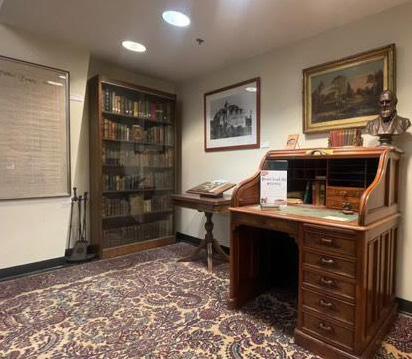
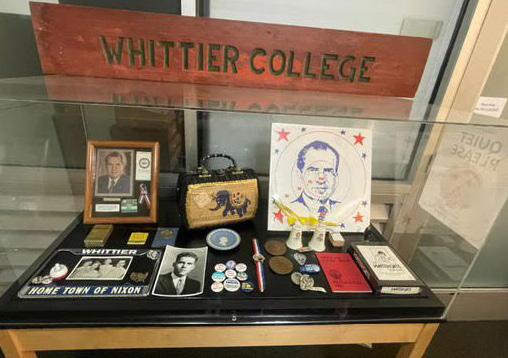
first issue all the way from 2019 before going digital, and nearly every copy of the award-winning literary a nd a rts j ournal, The Greenleaf Review
Since Harris began working in the Archives, she details that a favorite discovery of hers has been the love letters exchanged between Bud Kerker and his wife, Jane Weeks, who were a couple that lived in Whittier.
Their love story was engaging to her as they exchanged said letters while Kerker was training and eventually deployed during World
War II. According to Harris, “The letters are incredibly sweet and make the history of the war feel real in a way that I haven't experienced from secondary sources like textbooks.”
In our Archives, you are sure to find any resources with the help of Harris. Or, if you are simply interested in learning more of Whittier’s history, be sure to stop by and check out the archives on Tuesdays. And for those who are interested in donating, look to the Library page for rules and regulations that meet the Collections Development Policy.
Transfer Club Helps Transform The Campus
Darreionna Roche STAFF WRITER
Are you a transfer student that recently came to Whittier? Well then look no further than the Transfer Club! This club is made especially for transfers, as they provide a community of support as students transition from community college to Whittier’s bustling undergrad campus. Support and resources for members range from personal support, academic advice, to personalized contact with the career center.There is no better time to join the club as it was recently revived by fourth-year sister duo Mahi Mebratie and Aaliyah Broussard.
President Esiete (Mahi) Mebratie and V ice President Aaliyah Broussard’s primary mission with re-establishing the club is to rebuild the connections with the Whittier College student body who are out of state and international. Although transfer students were the main participants, Broussard felt it was time to make the club more inclusive. Mebratie is an international transfer herself, and Broussard transferred to the College as well. “We really wanted to give more visibility to the transfer club in and outside of Whittier, let that be in or out of state, and students that are global. We hope to provide support, let that be career help,
personal advice, or academic help,” Aaliyah states.
Second-year member Rebecca, explains that she chose Whittier because of the proximity to her home, and the College being a small school compared to her prior school allows her to meet different people and clubs. She recalls resources that made her transition successful such as the Office of Equity and Inclusion (OEI) and the art department.
The club describes transferring schools as a way of being a freshman again; you're lost, but you also have the same joy and excitement of being an upperclassman, and members describe the feeling as exhilarating to think what is waiting for you as a transfer.
International and diverse student bodies feel the struggle to find diversity on campus, and feel the divide of international students even from each other as to them they stay in cliques based on their similar in terests and countries.
International transfer members stress the need for conversations to be had at the College, like the reelection of Donald Trump and the stress some international students are now facing. It is different when an authority figure is communicating versus the student identity here at the College. A solution to this issue that the Transfer Club wants to use is to make it more personal, “It is a personal choice for an individual to be committed and take the time to take the resources that benefits
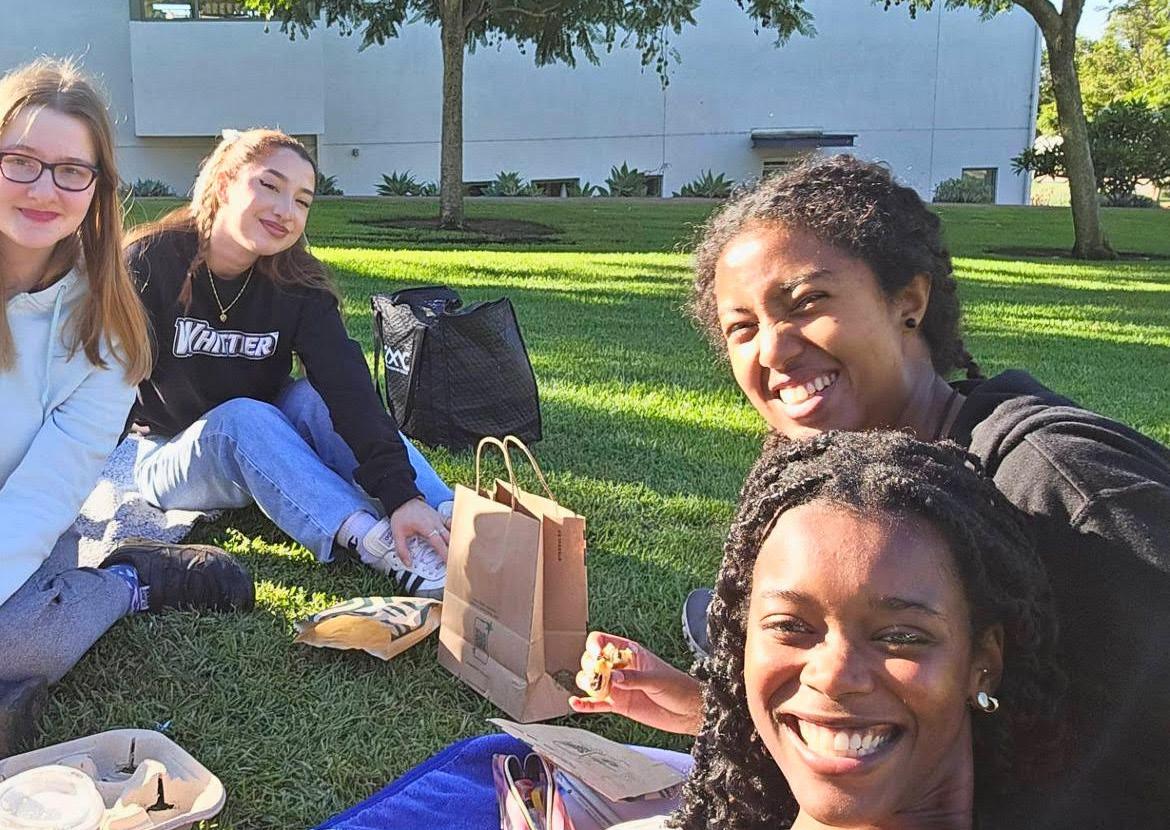
oneself,” member Malika expresses.
What empowers the transfer club and makes their time in college most beneficial is using the lessons, struggles, or triumphs, from previous schools they transferred out from to improve themselves, and allow themselves to experience diversity and inclusion of other people in the world more meaningfully. Another member of the transfer club and a member of the Warrior Poets Club, Richard, claims that the diversity on campus has exposed him in ways he hasn’t been exposed prior, and learns from different bodies and embraces different cultures and languages from those he surrounds himself with.
As a veteran, Richard found support from veteran resources, business professors supportive of his academic career goal. He expressed how many professors in the Kinesiology program supported him and just what he needed from his resources, let that be redirecting to another department, internships, financial aid, etc.
Transfer Club members find different forms of support depending on their majors and interest, but overall Center for Advising and Academic Success (CAAS) and the Career Center has been the primary support. They also claim that Whittier makes the transferring part of being a transfer relatively
easy. Additionally, the College provides additional orientation for transfers, as transfers typically have credits passed on and have a leg up and academic completion.
The hardships transfer students have faced is the general adjustment to a new environment. Finding a new pattern, comparing it to previous schools. Though members having a tight, neat community makes it easy to make new friends when you will always bump into the same people and that will spark into friendship. A common experience for transfer students is academics being their main focus and then building connections in later years.
What h elped B roussard navigate college life is personal connection. She and Mebratie want the Transfer Club to serve as the bridge of networking between transfer students of area of identity here at the College. They hope the club can serve as a resource in general for new students, and those who are transfers or contemplating transferring. “We are resilient, resourceful, and determined,” Broussard states.
If you wish to keep track of Transfer Club’s activities and future plans, you can check out their instagram @transferclubWC or attend the weekly Transfer Tuesdays in the Ortiz Lounge at the OEI from 12:30 p.m. to 1:30 p.m.
CAMPUS LIFE
Nov. 21, 2024
Staff vs. Students in a Game of Kickball
Chelsea Bartilad INTERIM EDITOR-IN-CHIEF
Jonathan Bermudez MANAGING EDITOR
Cold air fills the night. Lights shine down on the football field. Players—the students dressed in gray shirts and faculty dressed in black shirts—make their way to the field, ready to compete in the fierce sport of kickball. Cheers and shouts erupt from both teams and the sidelines as the game progresses—the chilly weather long forgotten by the game’s energetic atmosphere.
In partnership with the Athletics Department, the Veteran Resource Center and the Poet Warriors Club hosted the College’s second annual students vs. staff kickball game last Wednesday, at the Memorial Stadium Football Field from 5:30 p.m. until 7:30 p.m.
After a round of brief cheering from the audience, athletic and non-athletic students alike lined up at the front of the field, ready to kick and start the game. On the other side, Whittier’s faculty, numerous of which are from the Athletics Department, readied themselves on the field while also joking with each other and playfully taunting the students, creating a fun vibe for everyone
who was participating. After numerous rounds, with both teams radiating a competitive yet friendly spirit, the final score ultimately tallied to 8-3, with the faculty as the winners, ultimately redeeming themselves from last year's event.
“They can kiss my ring,” Jeff Garcia, laughs while recounting the outcome of the event. Garcia is the printing manager for the mail and print room here on campus. Along with a set of rings, the winners
received a gold ammo can that is placed at the Athletics Department. Though Garcia proudly displays his victory against the students, he believes it was a fun time all around. “I wish the staff had more staff versus student events, whether it be stuff like pie eating contests or other fun events,” he says.
For Garcia, it was a great time to meet other staff and gain a sense of community, because as he admits, he had never met any of the
other faculty that played alongside him before. He, however, still supports them by keeping a picture of the victory team as his wallpaper on his desk computer. Third-year Johnny Serbin, who played in the students’ team, exclaims, “It’s very rare that you see staff and students come together for something like sports, so I feel like it was [...] a great time [...] and it’s an experience I won’t soon forget.”
This event was part of the week-
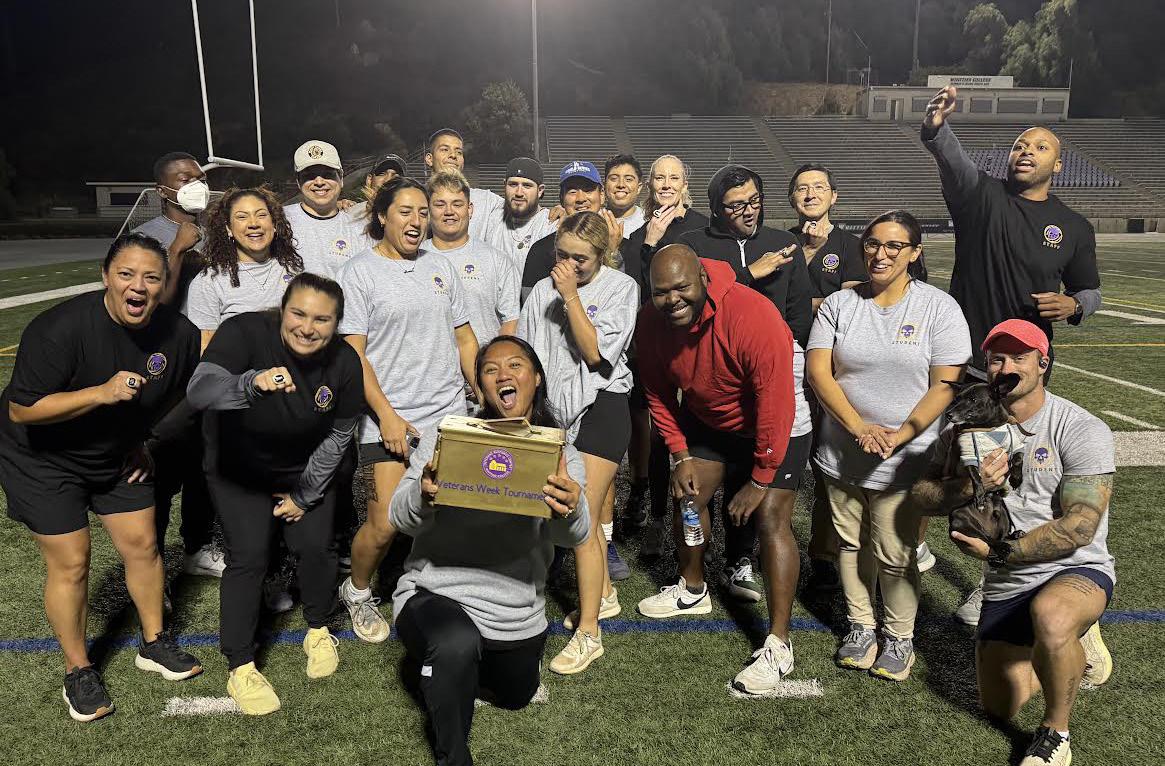
long celebration called Veterans Week at Whittier College. Hosted by the Veteran Resource Center and presented by the Poet Warrior Club, special events are held every day, such as the flag-raising ceremony and an appreciation breakfast, to highlight the veteran community on campus.
“Part of what we’ve been trying to do since building the Veterans Center is to connect our student veterans with different areas of the school [...] so they can have a community,” the Director of Student Conduct and Veteran Services Maria Cristina Navaja explains. “VET week is kind of our big thing where we can showcase our student vets and the community as a whole.”
Student-veteran Alex Molina says, “Overall, my experience was very pleasant. It’s always a good time when the veterans get together.” And from the spectator’s perspective, it seemed like everyone enjoyed themselves. Every participant had a smile on their face and supported one another, even with the opposing team.
When we think about kickball, some might think of the times they spent playing the sport in elementary school, but for the people who went to the event and participated, it will be remembered as a fun moment that brought the Whittier College community together.

Lights, Cameras, Action With Nathan Carrasco
Emma Galvan CAMPUS LIFE EDITOR
The scene begins outside of Hoover Hall, the sun is barely breaking through the gray clouds as the temperature slowly drops. The entrance nearby Hoover 100 is still and empty, with numerous plants growing behind two green benches and the sunlight hitting Menden Hall, the doors open and in comes third-year and President of Video Production Studios (VPS), Nathan Carrasco. While donning a black face mask, Carrasco is also wearing a black sweater over a pair of blue jeans, his white shoes are lifted up while he sits down on the bench closest to the mossy staircase.
Carrasco is a Film major with a minor in Religious Studies who came to Whittier College because of a teacher he knew, “I wanted to stay in the LA [Los Angeles] area,” he begins while looking at the Hoover Hall doors, “and I had a middle school teacher who came here so that’s how I knew of it and applied.” Though initially, he was iffy on the concept of being a Film major despite wanting to in high school, “I wasn’t really sure what I was getting myself into. I sort of knew that I wanted to pursue film and TV so I decided ‘May as well just be a Film major, it’s what you want to do.’” He explains softly, picking at the laces of one of his shoes.
And that decision eventually led to where he currently is now, as Carrasco has recently been elected as the newest President of Video Production Studios. According to
engage, VPS is a club on campus that “gears towards the production of creative and promotional content on the Whittier College campus. We seek to create a collaborative environment that aims to assist students with their own short films or projects, and help other organizations on campus film their events.”
Though Carrasco knew of its existence in his first year, “Somebody else was the president at the time, but
done for a class, I’m gonna be honest, but,” with a moment to recall, he continues, “I had the freedom to do whatever I wanted for my films, all of which I’ve written and directed. It’s been an interesting experience on how the process has been for creating said films, especially when looking for actors on campus and even asking different acting schools and theaters in the area that will be willing to read the script.”
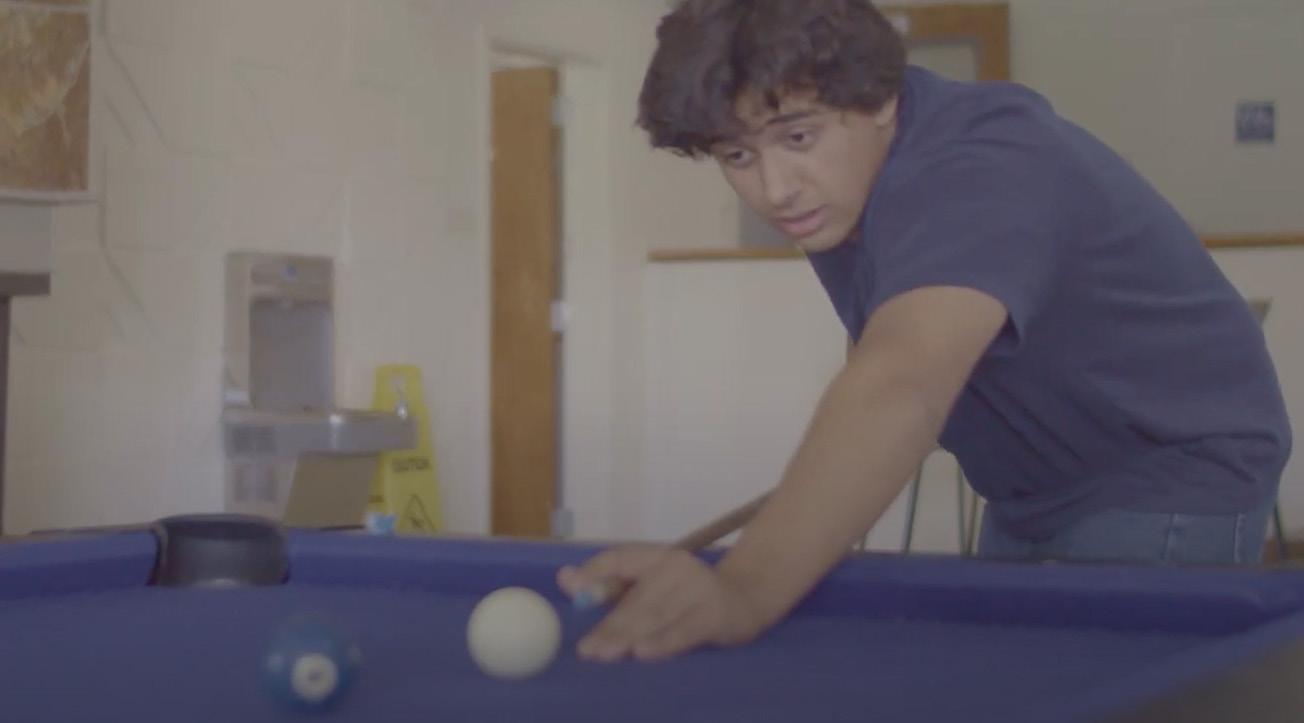
after that year my advisor [Professor] Patti McCarthy told me that nobody was filling up the position and she asked me if I wanted to take over.”
Clearing his throat, he explains that he eventually agreed to the position last Spring and has since been the President.
Many may know Carrasco for his short films that he directs throughout the Spring semester and eventually showcases at the student film festival.
Messing with the stitching of his jeans, he affirms, “All of my short films were
One experience he recalls, is his recent short film last Spring, “That was really interesting because all of the actors were not from the school, they found out about [the film] through Facebook. It was interesting to see adults that are willing to do this, even if it’s for free, and were willing to give it their all, [it] just gave me insight into this world.”
Trying to find out how to phrase the “world” he’s talking about, Carrasco concludes, “You do a job because you want to experience it, you really
love to do it, it’s not always about the money because you never know where it might leave you afterwards.”
Carrasco then unveils his plan with fellow third-year Salaar Ansari that has been in the works; the comedy TV series titled Adam’s Choice will follow a film student who is trying to navigate the world, “Just like I am,” he explains, “It’s been interesting […] writing what I think Film students might be going through. It’s kind of a difficult thing to get through, especially with lots of people thinking about going to school for film or should they pursue it afterwards.”
He goes on to discuss his own experiences after a brief pause, “It’s a really difficult thing to try and navigate, especially when you have no experience on sets, like myself, but I want to make a community because I like comedy. It’s a fun thing for me to work on, it’s a thing where I don’t have to put an amount of pressure on myself to make this many things, this many episodes in a certain amount of time, I’m doing whatever I want to do; so long as we think it’s funny, it’s something good to work on as practice.”
Though he jokingly finds the life of a film student boring, “You gotta think about what you wanna work on and why you’re doing it,” he establishes that it is fun and exciting to look for helpers but also stressful due to time constraints. However, he’s found a solution, looking determined as he explains, “Anything that you do as a film
student, it’s really just practice for what it’s going to be like in the job world. If you don’t take your work seriously as a film student, you’re not gonna take your life or your career seriously.” Without hesitation, he remarks, “If I’m editing a short film and I think ‘oh nobody is going to care about this anyway, it doesn’t matter,’ then nobody is going to care about it! A lot of the time, what I do is do research, watching videos and interviews on actors, directors, and editors and seeing what it is that they do and how they came about.”
While adjusting his posture, Carrasco remembers all of his mentors that have currently helped him. His first advisor was Professor Julie Collins-Dogrul, “She helped me get into the motion of being at the school,” he recalls fondly.
After settling on his major however, he switched over to Professor Patti McCarthy and has since been under her guidance. With a tone of admiration for the professor, Carrasco explains, “Patti has kind of given me an insight on what it’ll be like once I graduate. [She’s] given me connections in the industry that will be able to help with my questions.”
To keep up with Carrasco’s journey on developing his series, you can watch the first episode of Adam’s Choice on his YouTube channel—“it’s just my name, Nathan Carrasco.” You can also find his YouTube channel via his Instagram account ninjaro_26, where you can also find his first short film as well as music that he is currently working on.
Johnna Gaines the Heart of Whittier College
Emma Galvan CAMPUS LIFE EDITOR
“Hey future Poets!” can be heard on multiple social media platforms, often attached to a cheerful and kind smile. That smile belongs to first-year Film and Theater major Johnna Gaines, who has made quite a mark on campus for her numerous attributions to the College, which includes being one of the two new social media ambassadors, a student ambassador, a member of the Whittier College Dance Team, an Athenian, and having a prominent part in the Theater Department. With the ending of another week of classes, the campus is quiet, with only a few students walking around. One of these students is Gaines, who sits down at the Ettinger Lounge while slightly shivering due to the recent cold weather. “I’m trying not to get sick, but this weather is making it hard,” she jokes, resting her hands on her lap. She is wearing a long-sleeved green and purple sweater, with her light purple bracelets peeking out from her right sleeve; despite the shivering, she is still donning a big smile.
A fact some may not know about Gaines is that she began her social media journey on the former app Vine. “It was kind of [a] random [experience],” she laughs, “my dad just randomly decided to post to Vine and it blew up. It was mostly family content […] I really liked the skits, I want to be an actor
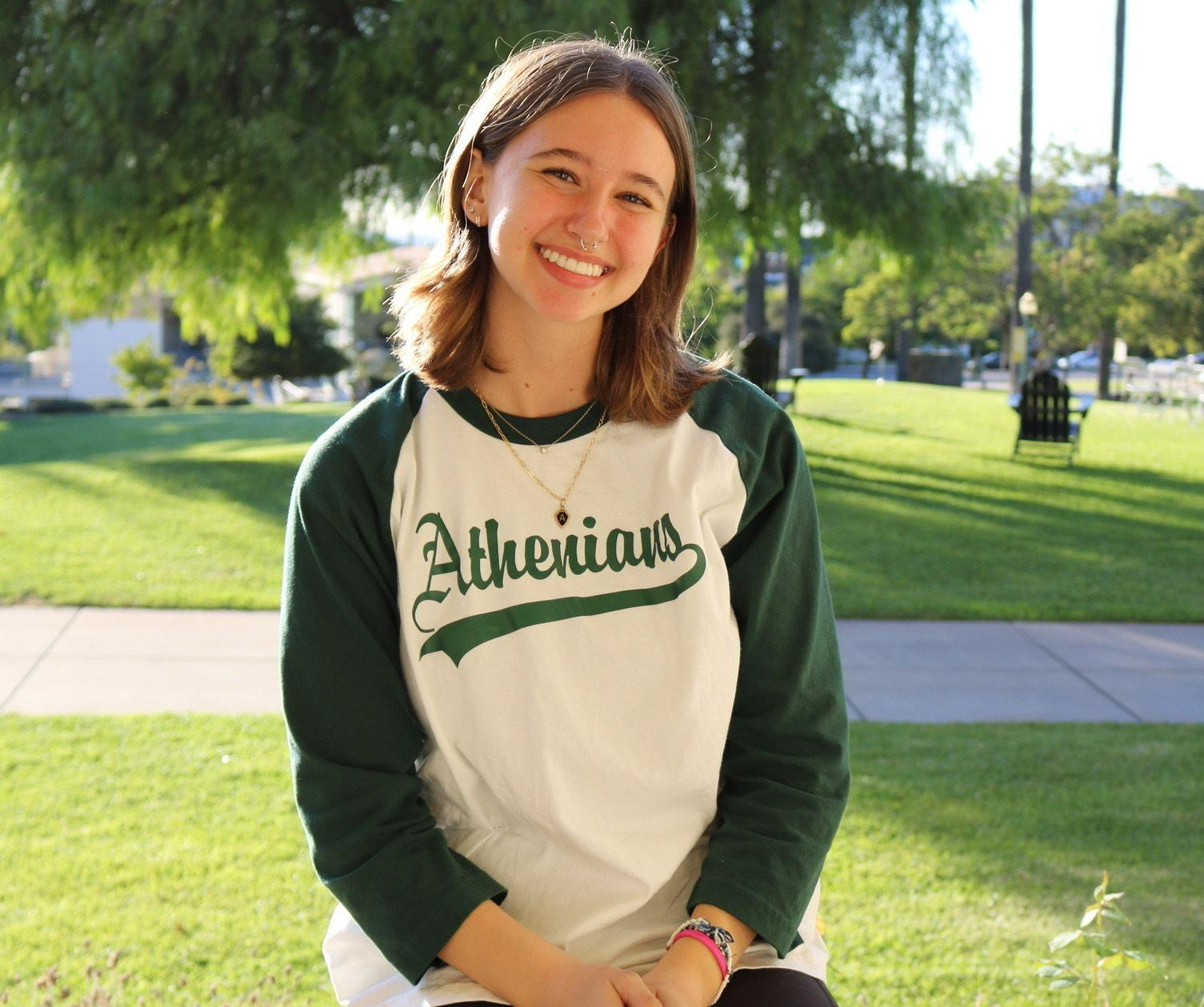
so that was probably why I always enjoyed being directed.”
Gaines jokes that her dad would take her and her siblings to the Dollar Tree as a “form of payment.” As the years went by and the app eventually deactivated, Gaines still continued to be involved with acting. “My elementary and middle school didn’t have a theater program, so I made a drama club,” Gaines recalls, while staring at the windows, “and when I went to high school I told myself ‘I’m gonna be in theater’ and continued to pursue it.”
She also confirmed that her Vine experience drove her to the social media ambassador job. “I feel like every little kid wants to be
a YouTuber when they grow up,” she continues after a pause, “Well I don’t know about kids now, but in my elementary school everyone wanted to be a YouTuber.” Moving her hands to motion what she was talking about, Gaines continues, “So I had a YouTube channel and I’d always post to social media, I had the experience and I felt that I could bring something to it.”
She summarizes that it felt like a fun opportunity for her and she applied to the job alongside the position of a student ambassador, securing both jobs right away.
Gaines is not the sole social media ambassador for the College, she does the job alongside firstyear Natalia Apacible. According
to Gaines, the two have gotten along very well and help each other out if needed, especially with each other’s posts. “On Halloween, she [Apacible] helped me out because I was doing interviews at the costume contest and she recorded for me,” she smiles fondly. Gaines also teases a possible podcast that the two have been discussing about, though at the very least they plan to have a collaboration soon.
The first-year does not stop at social media however, Gaines has quickly established many titles to her name in a few months. One of these titles is a being part of the Athenian society, which she recently has pledged into. “I did look into multiple societies, but honestly, the Athenians called to me. I really connected with all the Actives, a lot of them reached out to me to invite me to get lunch [with them],” she admires when thinking about the connections she’s made with the Ladies and fellow pledges, “It’s been amazing after officially joining. I love all my pledge sisters of course, we grew really close.” Her ambassador and society responsibilities are just a fraction of Gaines’ attributions to the College.
Recently, Gaines was one of the few leads in the College production of Priscilla Dreams the Answer where she played the role of Zop, a happy-go-lucky alien who tries to steer Priscilla to the journey she is trying to deny. After her first debut, Gaines continues to
be involved in productions as she is one of the three Whittier College students who will be performing in the upcoming radio play It’s a Wonderful Life. “I have not worked with all the directors just yet, but it’s still exciting to see the different ways they direct,” Gaines gushes. Though she is especially excited for her performance in It’s a Wonderful Life, grinning widely she explains, “Working with professional actors is kind of intimidating, especially when we get so few rehearsals before we actually perform. It’s a little less scary though because we have our scripts, I mean it’s a radio show,” she giggles.
Now that the semester is coming to a close, Gaines is coming up with new ideas for incoming students. Tying to her signature catchphrase “Hey future Poets,” she wants to highlight more about the application process. With a face of embarrassment, she admits, “I had a pretty hard time with my application process, I was late on a lot of it. It was really stressing me out, so I want to be that voice of ‘hey it’s okay, you’re going to make it.’”
Leaning back into the purple couches, Gaines ponders on her future at Whittier, which includes possibly becoming a Residential Advisor (RA), but she confirms in a soft tone that she’s just enjoying the moment. “I am hopefully gonna continue on doing the things I’m doing, just keep making my connections. I’m grateful for everyone’s support.”
OPINIONS
Once Again, Can We Stop Banning Books?
This article includes sensitive topics including sexual violence and instances of sexual assult, homophobia, and racism, which may be disturbing to some readers.
We used to live in a time when books were easily accessible, where teachers were “punishing” students by making them read long, “boring” novels that could be found on every bookshelf, like The Great Gatsby and Lord of the Flies. However, that’s not the case anymore for the up-and-coming generation of learners; instead, they are prevented from reading these novels and works by orders from their state or national government.
In a previous Quaker Campus article titled, “Put Book Banning to an End!” I went over the history of the concept and how it has evolved from “this novel talks horrible about our religion, don’t spread this,” to the modern tactic of “this harmless LGBTQ+ picture book is not for the children, toss it.” One year later, this heated topic is still being argued against; states are now prohibiting knowledge about known historical records.
PEN America recently recorded that over 4,000 novels were banned solely in the first half of the 20232024 school year from 42 states. The leading causes that were listed for these bans include topics of sexual violence, rape, experiences of race and racism, books about LGBTQ+ identities, and books with characters of color. Currently, some of the material included on such lists were not covered in the aforementioned article. It slowly goes from respectable reasonings to absolutely ridiculous reasons for a ban. According to an article from the New York Times, these rulings
were made by lawmakers with the encouragement of people who “describe themselves as parental rights activists” for the reasoning that they felt that children should now come upon these works without a parent knowing.
It’s an understatement to say that these new legislatures prohibiting students from reading are nonsense. The term “protect the children” is tossed around regarding education, but is it protection? We are in a new era where, in the eyes of the law, homosexuality is protected, but in society, it is not. These children will find out about the LGBTQ+ community anyway, but their restricted knowledge will lead to harmful behavior and comments that their peers do not deserve. It’s not that hard to tell our future generation about different identities; the entire curriculum is not centered around “being gay,” it’s to offer a safe space for children to learn and grow. Is that not what the purpose of schooling is, to learn?
I understand in terms of the sexual and physical violence aspect. Numerous books my friends and I
had to read for high school almost made us puke. I recall one instance when my friend read The Bluest Eye by Toni Morrison. They had no idea of its content and were whiplashed by the cases of incest and rape. The next few minutes were spent putting the book down and trying not to cry as I had to explain to the teacher that they needed time to regroup. Similar situations are present in modern works, namely Colleen Hoover’s books. These novels are allowed to be in the romance section of your local Barnes and Nobles, libraries, and Target with no warning of domestic violence and sexual assault for young and naive teenagers to stumble upon.
In recent years, lawmakers ruled that books made by historical figures such as Martin Luther King Jr. and Rosa Parks would not be part of the curriculum. This includes an instance in 2021, when a Pennsylvania school district banned books about the two figures alongside many other people of color that changed history. The reasons for this ban stemmed from “parental concerns and to improve diversity.” Improving diversity, by removing diversity,

that’s what school districts have been reverting to. The “attempt to improve diversity” was a foil to the actual agenda to protect and conceal the harsh realities of slavery and racism. Students already learn about similar topics, including colonialism and racism in their history classes, but is reading about personal accounts from people who suffered from it too far of a stretch? The point about history is that future generations need to understand the mistakes their ancestors made to improve our future. We can’t do that if students are not being taught something that was okay for centuries.
Instead, going against an amendment of the constitution is a priority. This past June, Oklahoma State Superintendent of Public Instruction Ryan Walters issued a law requiring all schools to learn about the Bible and the Ten Commandments. If we think back to the First Amendment, it states, “Congress shall make no law respecting an establishment of religion, or prohibiting the free exercise thereof; or abridging the freedom of speech, or of the press […]” By banning books about identities of individuals and their experiences while also mandating the teaching of Christianity, we are slowly turning against the Constitution we are taught to respect.
If anything, book banning started because of the different religious beliefs being written down. It’s a full circle in the worst way possible. The future of literature is unknown, with these legislators prohibiting voices from being heard. Nowadays, authors are preparing for their books to be banned from the get-go. While book banning could have its good intentions, removing horrible content such as The Bluest Eye, there is still yet to be a line drawn on society’s limits of censorship.
The Pure Irony of Helicopter Parenting
Sara Martínez
A&E EDITOR
Ah, childhood. The time in our lives where, according to neurologist Sigmund Freud, most of our personality develops. My childhood was, for the most part, good. I grew up in a middle-class family, mainly in a wealthy middle-class neighborhood in Cerritos, within the highly developed suburb of Los Angeles. Some of the trauma that I could only guess affected me stemmed from my parents’ early divorce, mixed with a lack of self-esteem and unhealthy attachment tendencies (yes, at least until I was 23; that boy was my life, duh). Despite my mom not allowing me to attend sleepovers, or go to Knott’s Scary Farm with the “cool kids,” I yielded much freedom. I walked home from school, got away with lying about early out days, and got away with not answering my phone for a few hours.
As a Zillenial baby, relenting my experiences with my younger Gen Z comrades seemed normal. That was, until I heard the same horrible stories of parents tracking their kids
with GPS, attending every single parent, school, or teacher meeting, and even hacking into their children’s social media accounts. Of course, in comparison to these sto-
parents express behaviors of overprotectiveness toward the child in a controlling manner. These behaviors can be the constant checking of a child’s location via cell phone, con-

ries, my life was not the hell that helicopter parents created for their children during childhood, which sadly continued for most even after entering college.
According to the National Library of Medicine, helicopter parenting is a parenting style in which
stant calling, or even camera monitoring. Although this phenomenon appears to be a new concept, it’s not. Lenore Skenazy, author of FREE-RANGE Kids and co-founder of the non-profit organization Let Grow, explained in an interview with Reason TV back in October

Dear Poet,
This will be my first Thanksgiving as a vegan, and my family doesn’t support this life choice. As a member of a turkey-loving family, what do I do?
-A Vegan Poet
Dear Poet,
First I would like to applaud you for making a healthy choice in your life. Giving up all meat and dairy products is no simple challenge. I know I won’t be able to do it, I just love cheese and hotdogs way too much. But don’t let your family make you feel bad for the choice you have made. You’re an adult who makes their own decisions and shouldn’t be giving in to those who won’t respect how you want to live your life if it’s a healthy way of living. I believe there are definitely worse ways you can live your life.
Though the history of the holiday isn’t perfect, we still recognize it as a day to be thankful for those who are in our lives. Your family should be thankful that you’re there to celebrate with them and not be so focused on you not eating a poorly cooked bird. Plus, Thanksgiving isn’t all about turkey. There are many options for vegans to eat like corn without butter, mashed potatoes without butter, bread rolls without butter, or everyone’s favorite, cranberry sauce. So your family should not be treating it like it is the end of the world. And if they truly respect you, they will get a vegan turkey. If they don’t, they hate you, vegans all around the world, and tofu.
In all seriousness, the consumption of meat should not be the reason you go “cold turkey” on your family. With everything happening in the world we have to be respectful of each other and love each other, because family and friends is all we have to get us through the tough times. Kindness and empathy is the only way to solve conflict among family. (But be ready to order some Uber Eats if all else fails).
Sincerely, A Poet
2012 that global media coverage is partially responsible. “When my parents were raising me, they could not reel off the names Elizabeth Smart, Jaycee Dugard, and Amber from the Amber alerts because the stories hadn’t become sensationalized. Local news was still local. So because the media loves those stories because they get the biggest ratings, those are the stories that inhabit our brains, and we [parents] start being afraid.” Skenazy has a good point, and it helps us map out the rise of helicopter parenting. Leigh Moscowitz, co-author of Snatched: Child Abductions in U.S. Media Culture, acknowledges the fear that the media installs, “News narratives become symbolic,” Moscowitz says. “They reflect social fears. The news tells us more about the fears of the time than what is actually going on.” According to Moscowitz, while media coverage of child abductions was at an all-time high, childhood abductions were at an all-time low. This irrational fear is part of what Skenazy and advocates for free-range parenting are trying to treat in parents who associate with helicopter parenting. Although parents feel that they are doing their best to keep their children safe, the results can be devastating to children as they transition to adulthood. As adults in college, we need the skills associated with independence, such as critical thinking, high self-esteem, and goal setting. From what I have seen in the classroom, students whose parents hover over them every step have more difficulty making decisions and being confident. Even worse, I wonder what these “adult kids” will confront when their parents are no longer there.
Poet’s Sports Schedule:
Women’s Basketball vs Trinity University
@ Whittier, Calif.
• 7 p.m.
• November 21
Men’s & Women’s Swimming and Diving at ELAC Collegiate Winter Invite
@ Monterey Park, Calif.
• 10 a.m.
• November 22
Men’s Basketball vs Willamette University
@ Orange, Calif.
• 5 p.m.
• November 22
Men & Women’s Cross Country at NCAA DIII Cross Country Championships
@ Terre Haute, Ind.
• 9 a.m.
• November 23
Men & Women’s Swimming and Diving at ELAC Collegiate Winter Invite
@ Monterey Park, Calif.
• 10 a.m.
• November 23
Men’s Basketball vs Texas Lutheran University
@ Orange, Calif.
• 5 p.m.
• November 23
Men & Women’s Swimming and Diving at ELAC Collegiate Winter Invite
@ Monterey Park, Calif.
• 10 a.m.
• November 24
Women’s Basketball vs Whitworth University
@ Whittier, Calif.
• 1 p.m.
• November 24
Men’s Basketball vs Southern California Leadership University
@ Whittier, Calif.
• 1 p.m.
• November 26
Men’s Basketball at Occidental College
@ Los Angeles, Calif.
• 7 p.m.
• December 4
Women’s Basketball vs Nelson University (AZ)
@ Whittier, Calif.
• 7 p.m.
• December 4
Women’s Basketball at Claremont-Mudd-Scripps Colleges
@ Claremont, Calif.
• 2 p.m.
• December 7
Men’s Basketball at Claremont-Mudd-Scripps Colleges
@ Claremont, Calif.
• 4 p.m.
• December 7
SPORTS
Men’s Lacrosse Writes a New Legacy
Chelsea Bartilad INTERIM EDITOR-IN-CHIEF
In Fall 2022, the previous administration of Whittier College announced the removal of three sports programs, including Men’s Lacrosse, in an attempt to cut down on spending and address the administration’s concerns about the safety of student-athletes involved in “contact sports.”
Established in 1980, the College’s Men’s Lacrosse program was California’s final National Collegiate Athletic Association (NCAA) lacrosse team. In April 2023, the team left their final season with a winning score of 20-10 against the UCLA Men’s Lacrosse team. Having won 10 championships in the Western Collegiate Lacrosse League (WCLL) conference from 19801999, being nationally recognized by the USCILA, and having a final four appearance at NCAA Division III—the 2003 team being inducted into the Whittier Athletics Hall of Fame in 2018 as a result—this final win solidified their legacy at Whittier College.
Following the announcement, lacrosse alumni Joe McCarthy and Joe Damm organized a fundraiser during the Spring 2023 semester to reestablish the program. Since then, the campaign has raised over $185,000, surpassing its initial goal
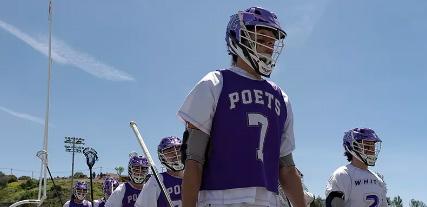
of $145,000 from over 130 donors, where the College will use the funds to find a new head coach for the program and recruit players. On May 10, the College released a statement announcing the Board of Trustees’ ratification of the return of Men’s Lacrosse for the 2024-2025 academic year as a club sport. “One of the reasons why we have this opportunity is because the alumni really stepped up,” explains the Director of Athletics, Rock Carter. He continues, “[They] have done a really nice job at fundraising and getting it to where we can put it into the athletic area and give our students a good experience.”
Having previously been an NCAA sport, the reinstated Men’s Lacrosse program is now part of the Men’s Collegiate Lacrosse Association
(MCLA), where they will compete against local universities in the West region, including Chapman and the University of California (UC) schools.
In October, the athletic department welcomed Todd Francis as the new head coach for the Men’s Lacrosse program. With 40 years worth of experience in lacrosse, including playing, coaching, and running a business that trains lacrosse coaches and players, the new head coach brings his expertise and determination to the field. In the recruitment process, Francis has spent his time speaking with other coaches and attending tournaments, looking at prospective students interested in joining the team for the 2026 season. Expressing his expectations in a student-athlete,
Francis says, “If you’re a dedicated, driven athlete, and [...] you want to be part of this program specifically, [...] I’ll take that [type of sportsman] over the kid who is a really good player and [yet] doesn’t care about his team.” He continues with a determined look, “We’re just trying to bring in the best 20 to 25 student-athletes that [...] have a desire to take this [program] back to the level that it was for many, many years.”
In addition to building up a strong team, Francis aims to create a lacrosse program where its athletes can play and are set for success in the long run. “My goal is to get kids a better education because they’re good lacrosse players,” he says.
Having attended Cornell University and played lacrosse professionally for 10 years, Francis recognizes the importance of having a good education alongside a rewarding athletic career. “[The] alumni network I have is stronger than anything [...], and I want other kids to be able to do that,” he adds, “I’m a firm believer [that] if you choose the right school to play, then you have an opportunity to really set yourself up for the rest of your life.”
Fueled by the support of alums and their new guidance under Francis, the Men’s Lacrosse program is on track to continue its notable legacy at Whittier College.
Student-Athletes’ Secret to Success
Sara Martínez A&E EDITOR
For students at a Liberal Arts College, a cross-disciplinary education of an extensive breadth of subjects—including the humanities and mathematics—can seem cumbersome, especially if you are a student-athlete. Here at Whittier, non-athletes wonder how their athletic peers can juggle grades, homework, and studying while also having to practice, attend weekend games, and integrate supplemental weight room training. Despite this worry, however, Poet athletes have proven that they can dominate the playing field, hold academic honors, and maintain rigorous schedules.
Although there is a notion that collegiate athletes have an “easy” academic workload, this can not be said for Whittier College athletes.
In line with the College’s Mission, the Athletics department’s mission also emphasizes personal development, fostering community, and diversity. According to the statement, the program’s goal is to “promote optimal physical, emotional, and personal development in its student-athletes, [that] supplements the classroom experience, and provides balance to academic life.” Poet athletes, therefore, have no “shortcut” and take the same rigorous courses as their peers. Furthermore, when recruiting, some coaches try their best to find not only students who are committed to their sport, but to their education as well. Head Cross
Country & Track Coach Katherine Graham says, “I don’t want to be behind this person asking for paperwork. I want to know that they are responsible for their academics, because that responsibility will also show up as coming to practice on time and being prepared.”
So, how are our Poet athletes able to manage such a packed schedule? According to fourth-year Alyssa Bolden, “Having a planner” is only part of the equation. Bolden, majoring in Biology, is also part of the Women’s Softball and Cross-Country teams. “When it comes to managing my time, I like to keep everything in a planner and on my phone. Using both of these tools has not only helped me with time management but also figuring out how to squeeze in homework during any available free time. This helps because having my homework done early has proven to be the most effective in keeping my grades up.”
Fourth-year Analise Kusleika also focuses on time management to maintain high grades and
playing volleyball. As the middle blocker on the Women’s Volleyball, Kusleika and her teammates were able to accomplish a great season, with 11 conference wins and earning a No. 3 seed spot at the SCIAC Postseason Tournament. Majoring in Child Development and double minoring in Spanish and Kinesiology, Kusleika draws fine lines between her two worlds, “I always have a stopping point. Before 5 p.m. every day, I focus entirely on my academics. Once 5 p.m. hits, it’s sports time, and I turn on volleyball mode.”
Poet athletes also integrate the skills they learn in their sports into skills they can use to maintain high grades, embracing the College’s intersectionality spirit. For all-star dual athlete Bolden, “Being in multiple sports has taught me discipline and drive. Using those skills helps not only in my sports but in my classes. Without discipline I wouldn’t be able to give my grades up, which would also affect my eligibility to play.”
Warren Canciller also acknowl-

edges discipline, as he is required to attend study hall hours in the Center for Academic Advising & Success (CAAS) on top of Baseball practice since he is a first-year student. Aside from Baseball and school, Canciller also participates in campus events, including cultural activities, “Experiences like this prove that you are going to get the most out of your college years by becoming involved in numerous campus life activities.”
Canciller, who boasts a high GPA, attributes “Responsibility, persistence, determination, communication, goal orientation,” and even “collaboration” as skills he learned in playing Baseball that helped him excel in his studies. “Collaboration is essential in both physical and academic activities throughout your life. When playing games with friends on the field, we [athletes] face the same feeling [collaboration] when completing group projects and presentations.”
While these students are only some of the program’s 250+ athletes, they help paint the picture of what our Poet athletes’ lives are like. Just like their peers, they also must participate in campus life and maintain high grades on top of representing the college’s legacy sports programs. Unlike widespread rumors that athletes “stay in the GAC,” they are also found in honor societies, campus activities, and even CAAS study hours. If anything, Poet athletes might push the boundaries of education further to include the physical, proving these poets to be active in all aspects of the Whittier College community.
The Soccer Captain’s Unexpected Journey
Ty Wilson’s final season as a Poet was disrupted, yet he remained undaunted, embodying resilience throughout the journey. Hailing from Kirkland, Washington, the fourth-year faced a high school senior year cut short due to the COVID-19 pandemic, which made his path to college soccer anything but easy. With showcases canceled, he took the initiative, sending countless emails and highlight videos to Division III programs, ultimately landing at Whittier College. His choice to focus on Division III stemmed from a desire to play immediately and make an impact as soon as he stepped on the field.
“I knew I wanted to play at the Division III level because I wanted a chance to play as soon as possible,” Wilson reflects. Moving to California was also appealing; Whittier’s soccer team had players from Washington, making it feel familiar despite the distance. His commitment to pursuing his dream amid unforeseen circumstances showcases his tenacity. From the moment he arrived on campus, Wilson was determined to face the unique challenges of college soccer with resolve and a hunger to grow.
As a first-year, Wilson initially played in the midfield, a role demanding technical skills, quick thinking, and adaptability. “Playing in the midfield is definitely one of the harder positions on the field,” he says, acknowledging the challenges he faced. “You have to be super technical, have a good first touch, and play quickly with the ball.” Despite his passion for

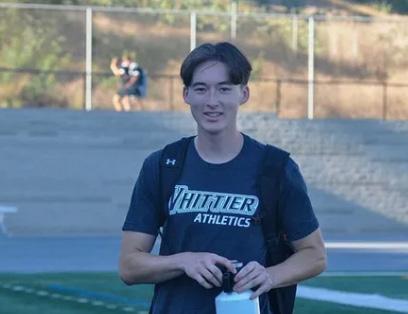
soccer, adjusting to the intensity of the college game proved difficult.
“I don’t think I was really ready exactly for that level of college soccer,” he admits. However, Wilson’s willingness to adapt paved the way for his success.
Over time, Wilson found his place on the field by shifting to defense, allowing him to utilize his skills from a new vantage point.
“Transitioning to defense was actually a lot easier because I played so much in the midfield,” he explains.
In defense, Wilson could see the field more fully, reading the game and reacting with developed vision and awareness. “It’s definitely been a lot easier [in defense] because […] you get to see the entire field,”
he says. This shift helped him settle into his role, using his understanding of offensive and defensive strategies to contribute effectively to the team.
Wilson’s journey at Whittier extended beyond his position on the field. As he advanced through college, the relationships he developed with teammates became increasingly significant. Reflecting on these connections, Wilson notes, “I met my best friends here, guys that will be in my wedding one day.” His teammates forged these bonds through practice, team events, and shared challenges.
He faced a significant setback in his final year: a preseason inju-
ry that sidelined him from gameplay. For someone so passionate and competitive, this injury was a heavy blow. “When my injury first happened, it was literally the first couple of days of preseason,” he recalls. “At first, I was hopeful that I’d recover quickly […] but as time went on, it was definitely really hard, emotionally.”
In the face of this disappointment, Wilson leaned into a new role on the team. His focus shifted from being just an athlete to becoming a mentor and leader for younger players. “I realized that even if I’m not playing, then I kind of have to step into more of a leadership role,” he says. With many first-years on the team, Wilson took it upon himself to guide and support them, offering advice on everything from academic responsibilities to navigating the pressures of collegiate athletics. “I really emphasize trying to help out the first-years,” he explains, “whether it’s on or off the field, helping them talk to professors, or giving them tips on how to balance things.”
This commitment to supporting his teammates is a hallmark of Wilson’s leadership approach. While he could no longer contribute physically, he continued to make a lasting impact on the team. Wilson emphasizes the importance of seizing every opportunity and persevering through misfortune, especially for first-year student-athletes adjusting to collegiate sports. “I tell a lot of the guys that aren’t getting minutes […] you just have to be patient, and you have to believe in yourself,” he says. “Make the most of every opportunity you get. Whether you’re getting five minutes a game, you have to make the most of those opportunities.”
Wilson’s guidance goes beyond
motivation; it exemplifies unabated dilligence in a rollercoaster year for his teammates to emulate. “For me, the best captains I’ve had on this team are the ones who take the role with pride, helping the younger guys and doing all the extra stuff that no one else wants to do,” he explains. From picking up gear after games to guiding new players, he exudes accountability: “It’s just a lot of responsibility, and I think the best captains are the ones who take a lot of pride in it,” he adds.
Wilson’s love for soccer and dedication to his teammates reflect a deep-rooted passion for the game. Unlike some players who might lose interest, he feels his enthusiasm has only grown. “I’ve just grown to love the game even more as I’ve gotten older,” he shares. “I want to try to play soccer as long as I can, until I’m 40 or something crazy like that.” For Wilson, soccer is more than a pastime; it drives him athletically, academically, and personally. “Soccer keeps me motivated to stay on my schoolwork [due to] its competitiveness and the team spirit,” he notes.
As Wilson nears the end of his college soccer journey, he reflects on the lessons learned at Whittier. His experience transcends wins or losses; it encompasses the friendships built, the resilience developed, and the impact made on his team. Wilson’s journey highlights that college sports are not just about individual accolades, but collective growth, leadership, and unforgettable bonds. Looking to the future, Wilson carries these experiences with him, confident that the challenges he has overcome and the lessons learned will shape his path, whether in sports or beyond.

The QC Staff
Suggests:
Want to know what our Staff Writer recommends this week? Read on!
Music:
I have been solely in love with Billie Eilish. Eilish's music has comforted and aided my mental health battles. Her most recent album Hit Me Hard and Soft gives a mix of emotional ballads with songs like "Skinny", "The Greatest", and "Wildflower". It also has pop sensations "Birds of a Feather", and "L’amour De Ma Vie".

Restuarant:
My favorite place to eat is L&L Hawaiian BBQ , which is 10 minutes away from Whittier. I am obsessed with their spam musubi! It reminds me of home, friends, and family with whom I have enjoyed eating it with. I highly recommend to pair it with their volcano sauce and saurache’ sauce.

Art:
Recently I have been reintroduced to the fiber arts through people I have become friends with during my short time at Whittier. I have picked up cross stitching, knitting and crochet. It is really relaxing and fufils my overall human need to be creative, especially in this era of AI.

Movie:
I recommend a feminist film called Damsel available on Netflix. The film stars Millie Bobby Brown who plays Elodie, a headstrong woman who wants agency over her own life. Brown's performance is great.

ARTS & ENTERTAINMENT
MM..FOOD for the Troubled Mind
Elias Loya COPY EDITOR
You all probably have a long list of your favorite rappers; Tyler, The Creator, Earl Sweatshirt, Childish Gambino, JPEGMAFIA, etc. Despite their difference in subgenres within rap, what do they all have in common? A deep appreciation for an underground masked rapper by the name of MF DOOM. DOOM has been cited as one of the most influential MCs ever, with some of his albums serving as the basis for what we know as hip-hop today. One of his albums, the legendary MM… FOOD is getting a 20th anniversary re-release featuring remixed songs, and even snippets of an interview. But who is this masked rapper, and why is MM…FOOD important enough to get an anniversary release?
Daniel Dumile, the person behind the mask of MF DOOM, was born on July 13, 1971 in London, and raised in Long Island, New York. He emerged as a member of the early 1990s hip hop trio KMD, under the name of Zev Love X. Following the death of his brother, as well as the dissolution of KMD, Dumile took a break from music, until returning in 1997 under the moniker of MF DOOM. This new persona was depicted as mysterious and villainous and was accentuated by his most known symbol, his replica gladiator mask.

DOOM became one of the genre's most enigmatic and influential artists. His music is characterized by its complex lyricism, obscure samples, and offbeat rhythms, which earned him a cult following and critical acclaim. Some of his work includes Operation: Doomsday (1999) and Madvillainy (2004), both of which are considered some of the best in underground rap. He also had a large array of alter egos like Madvillain, King Geedorah, DANGERDOOM, and Viktor Vaughn.
DOOM's ability to blend comic book mythology, science fiction, and pop culture with socially conscious themes made him a unique
voice in hip-hop. In 2004, MF DOOM released the project MM…FOOD, which he asserted was a concept album based on the foods you would have at a picnic or on a picnic table. One of the biggest details about this album is the production quality; through a mix of sampling older cartoons, and snares, DOOM was able to solidify his signature sound. The colorful and cartoonish album cover matches the wide variety of themes within the work, with topics ranging from rappers building up “beef” with others to boost their careers (“Beef Rapp”), to the struggles of finding and maintaining genuine friendships (“Deep Fried Frenz”).
Combining his clever wordplay from culinary metaphors with his signature production quality, MF DOOM was able to create an album that innovated a new approach to hip hop.
Despite his lack of mainstream recognition, DOOM’s influence on modern hip-hop is immeasurable. His blend of abstract storytelling, lo-fi production, and elusive persona solidified his place as a true icon of the genre, and with albums like MM…FOOD, he continues to inspire a generation of artists who followed in his footsteps. Whether you choose to listen to this masterpiece and apply its lessons to the world around you or not, just remember,
The Glory & Gore of Gladiator
Olivia Nuñez SPORTS EDITOR
“Are you not entertained?” Russell Crowe’s arms extended toward the crowd in anger is an emblem of defiance and cinematic masterpiece. Director Ridley Scott’s brainchild, Gladiator (2000) has been long acknowledged as one of the best films from the 21st century. The political power struggle between the Romans at the forefront also speaks to social class struggles, the nature of humanity, and the will of man, something captured in Crowe’s masterful performance as Maximus.
The first Gladiator movie has been heralded for its epic fight scenes, powerhouse acting and overall presence as an action movie with substance. It was recognized by many critics as a directorial masterpiece as it was the 2001 Academy Awards’ Best Picture Winner, where Crowe also won for Best Actor in a Leading Role and Hans Zimmer was awarded yet another award for Best Music/Original Score.
Perhaps this success motivated Scott to focus his attention on a second installment of the successful film 24 years later in Gladiator II (2024).
The film was first announced in 2018 as a possibility but was not cemented until they cast Paul Mescal as Lucius. Lucius is the protagonist for Gladiator II and is the son of Maximus, the protagonist of the first film played by Crowe. Connie Nielsen will reprise her role as Lucilla, the powerless female voice

who is repressed by yet another tyrannical figure. Mescal is supported by actors like Joseph Quinn and Fred Hechinger as the emperors, Pedro Pascal as Marcus Acacius, and Denzel Washington as Macrinus, the sage figure who guides Lucius through his idealistic return to power.
The first film’s budget was half of what Gladiator II required at 103 million, as opposed to Scott’s generous 210 million budget this time around. Though the chance to follow a movie as great as the first Gladiator might present some with nerves, the cast was eager to jump aboard because of their captain.
In an interview with IMDb, Mescal and Washington discussed what it was like to work with a director like Scott. They attribute full transparency and his emphatic reaction to each take whether good or bad as reasons the filming process works so smoothly with Scott. Washington, an experienced actor
who has worked with numerous directors states, “If you don’t trust the Pilot, don’t go. He’s a pilot I trust absolutely. I’ll go anywhere he wants me to go.” Similarly, Quinn who plays Emperor Geta agrees, “It was clear from the off that he was driving the ship.”
The responsibility to emulate Maximus, or at least attempt to, rest on Mescal’s shoulders, something he is well aware of. Scott was quick to inform him that his nerves were not conducive to the filming process. Describing the interaction, Mescal recalls in the IMDb interview, “What he’s saying like, ‘This is so much bigger than your own anxiety, and we’re going to be making this together.” Through all the overwhelming moments, Mescal felt grounded in the work that he was doing and the guidance of his fellow cast members in the most difficult scenes.
"I got my a** kicked,” Pascal laughs off when referring to the
fight scene done with Mescal. It was filmed during an unseasonably warm day and Scott insisted on filming it from start to finish, something serviceable to the film but not so much for the actors. Still, as mentioned before, they trusted Scott’s process and made sure to give their all in every fight scene because there was always a camera on them.
As a result of the high-budget theatrics and somewhat outlandish elements (like human-eating monkeys or a flooded coliseum with sharks), critics are quick to place its predecessor on a pedestal in comparison to the sequel.
A Variety review claims Gladiator II (2024) is “[...] a Saturday-night epic of tony escapism. But is it great? A movie to love the way that some of us love “Gladiator”? No and no. It’s ultimately a mere shadow of that movie. But it’s just diverting enough to justify its existence.”
ARTS & ENTERTAINMENT
Washington Family Upholds Wilson's Legacy
Sara Martínez A&E EDITOR
On Friday Nov. 22, Netflix will premiere the T.V. adaptation of August Wilson’s 1987 Pulitzer-winning play The Piano Lesson. Part of Wilson's Pittsburgh Cycle play series, The Piano Lesson centers around the legacy of a piano and its effect on an African Americans family. The film adaptation will present an all-star cast—including Danielle Deadwyler, Corey Hawkins, Skylar Smith, and Samuel L. Jackson— while also featuring the directing debut of Malcom Washington.
Set in a segregated Pittsburgh neighborhood in 1936, two siblings, Bernice (Danielle Deadwyler) and Boy Willie (John David Washington), have two opposing views on the family piano. Boy Willie wants to sell the piano and use the funds to buy land. Bernice wants to keep the piano, as it is a reminder of the tortuous relationship between her parents.
To make matters worse, the land that Boy Willie wishes to buy is owned by the Sutter family, who used to be the slave masters of the Charles family ancestors. The story is then set in the scope of African American themes of struggle, generational trauma, survival, and future told through the eyes of a family
and their ancestors.
In almost an ironic setting, the Charles family story will be portrayed by another family, the Washington family. Acting legend Denzel Washington is producing the film, with his youngest son Malcom directing the film, and his eldest son John David Washington playing the role of Boy Willie. John David will reprise his role as Boy Willie, as he played the role during the broadway
revival of the play in 2023. The Piano Lesson is the third of Wilson's plays that Denzel Washigton has produced, following Fences (2016) and Ma Rainey’s Black Bottom (2020). The other plays that will eventually be produced either as movies or as limited T.V. series are: Gem of the Ocean, Joe Turner's Come and Gone, Seven Guitars, Two Trains Running, Jitney, King Hedley II, and Radio Golf.
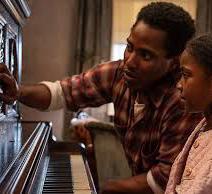


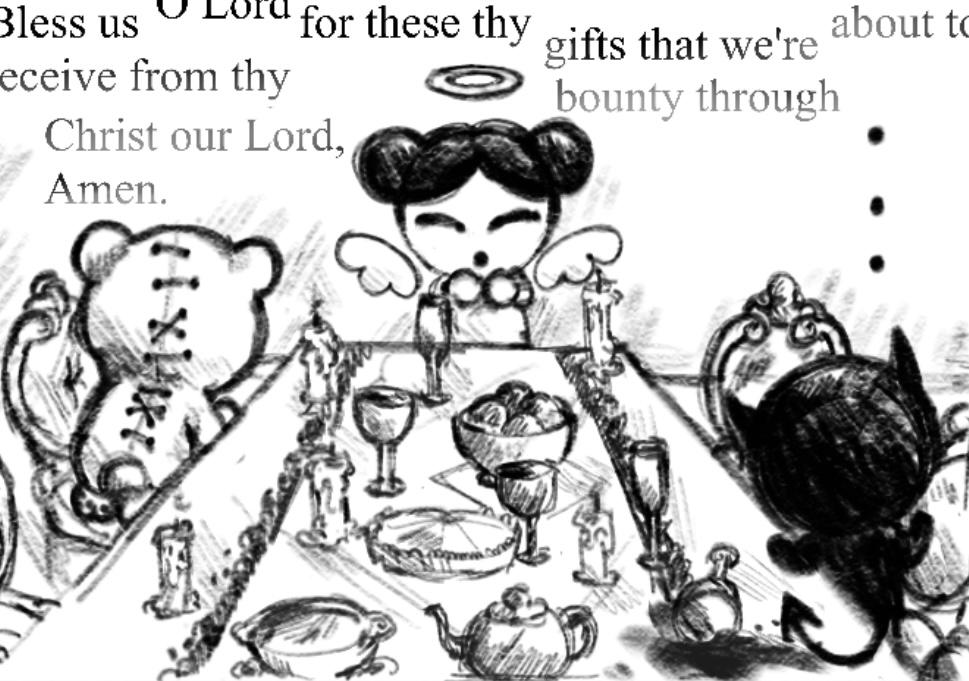

Washington announced back in 2015 that he would be producing all ten of August Wilson’s Pittsburgh Cycle plays, after receiving permission from the Wilson Estate. In an interview with Broadway World, Washington demonstrated his care in adapting Wilson's plays, “Film is a completely different medium than stage, and with August Wilson, in particular, each line is like Shakespeare. Each line of dialogue is like a poem unto itself.”
For those who are unfamiliar with August Wilson, here is a brief overlook on his legacy. Wilson was born and raised in Pittsburgh Pennsylvania, which is also the setting for a majority of his plays.
After a teacher accused him of plagiarism, he dropped out of highschool and began writing plays and poetry.
Wilson was known to say that he got his education from the four B’s: the blues, painter Romare Bearden, the writing of Amiri Baraka, and Jorge Luis Borges. In 1968, he became the cofounder and director of Black Horizons Theatre, an African American theater group that promoted theater for the Black community by the Black community.
Speaking on the importance in both The Piano Lesson and the works and life of August Wislon, I sat down with English Professor
Douglas Manuel II to explore his thoughts on the subject matter.
SM: Why would you recommend students to watch the T.V. adaptation?
DM: "I would say because T.V. is the most digestible and accessible form of medium for storytelling these days. As educators, we are coming to realize that in order to reach students, we must meet them halfway. That being said, student attention is best held with T.V., movies, short videos, and social media. Having this visual representation will hopefully be a gateway for students to want to read and go see Wilson's plays instead of just watching them on T.V."
SM: What is the importance of legacy in both how it is portrayed in The Piano Lesson and in the recent adaptations of Wilson's Pittsburgh Cycle?
DM: "The great poet Adrienne Rich said in her poem Diving into the Wreck, “a book of myths in which our names do not appear.” African Americans are so often left out of the canon and conversations. In The Piano Lesson and in the larger idea of reviving the Pittsburgh sequence, I believe Denzel Washington and others are making sure our names [Black folks and Black stories] are involved in the canon.
